#extremely specific and especially the bit where they have complex relation with their father figure
Explore tagged Tumblr posts
Text
characterization cheat sheet: the batfamily boys
Hey everyone! I had the idea to compile a comprehensive list of different traits and attributes for each member of the batfamily based off of both canon and fanon interpretations. I think this could be useful for new members to the fandom, or those looking to write and/or draw for these characters. Remember that these will have a slight bias considering I, a fanon creator, am creating the lists. But I’ll try to make them as accurate as possible.
Appearances vary from artist to artist, so I’ll try to stray away from general details and add more little things you can consider in your art.
Bruce Wayne:
Age: 35-45
Appearance: Extremely physically fit, but signs of aging and prolonged exertion can slip through. Has a collection of scattered scars varying from fresh to fully healed. Strong, dark features. Conventionally attractive, but can easily switch to be foreboding/intimidating. Well kept in public appearances, but can look like death incarnate when in private.
Personality: Dual personas: “Bruce” (at home, but not as batman) and “Brucie” (public appearances like galas, news interviews). Bruce is stoic, well-read and educated, well-mannered, and occasionally can be witty and laid-back. Smirks rather than smiles. Brucie is loud, spontaneous, charming, and sometimes oblivious. He is the womanizer and scandal-maker. Often the actions of Brucie are motivated by Batman’s interests.
Speech: Bruce was mainly raised by as English butler, so his speech patterns are proper and smooth. Rarely uses speech fillers such as “uh” and “um,” except when interrupted while concentrating. Despite living in Gotham his entire life, he has not picked up the accent. His voice is newscaster American, almost impossible to pinpoint to a certain region. His speech as Brucie changes to relate more to the audience he is addressing. Speeches to Gotham high society will sound different than those aimed to the general public.
Additional Attributes: Bruce Wayne in all of his personalities is fiercely protective, and can easily slip into a deeper voice to intimidate. Bruce can be extremely empathetic and slightly impulsive when it comes to children who have lost their parents. As learned through his training to become Batman, Bruce is disciplined and can work for hours straight.
Dick Grayson:
Age: 23-29
Appearance: Dick Grayson mirrors a young Bruce Wayne despite their not being blood related. This could be a subconscious action by Dick to absorb traits of his father figure. His lean acrobatic body starts to set him apart from Bruce’s image. Dick manages to be well-built but still limber and flexible. His feet and hands are rough and calloused. His hair can get long but usually stays at a length in between Bruce’s and Tim’s. His eyes are bright blue without even a hint of green or brown.
Personality: In one comic I believe it was Superman who said that Dick Grayson is a universal constant, meaning that on every alternate earth or timeline, you can always rely on him to be good and pure. I think this really sums up who Dick should be. He is kind to a fault, and can sometimes be naive and not think things through. He loves to love, be that in his family, in his romantic relationships, in his friendships, and even in strangers. He is a chronic hero who only wants to see the world as a better place. But it’s important to note that Dick can get angry when pushed, and holds grudges.
Speech: Dick is an extremely interesting study in speech patterns. As a child he traveled with the circus, until he lived with clear-spoken Bruce Wayne and a proper English butler. So influences to his speech and accent come both internationally and locally to Gotham and Bludhaven. As a child living at Wayne Manor, Dick picks up a slight Gotham tinge to his accent with some British flourish in his vowel sounds. He regularly speaks in slang. As Nightwing he is able to suppress his unique speech to sound more evenly American.
Additional Attributes: Dick acts differently around each of his family members as to be what they need in a big brother. For example, he is more fatherly to Damian while to Tim he is more an equal. Dick can fidget and has less of an attention span than Bruce. He can use jokes as a coping mechanism.
Jason Todd:
Age: 22-26
Appearance: Hair is often long on top and shorter on the sides, sometimes with a white streak as a side effect from the Lazarus Pit. Tallest and heaviest of all the kids, very physically intimidating. Has a lot of scars and burns, and in some fan works he has a “Y” shaped scar the length of his chest from his autopsy. Never skips leg day. Green/blue eyes.
Personality: Jason goes through a lot of character development, but for this list I’m going off a timeline of post-Under the Red Hood, where Jason is on okay, yet still a little shaky, terms with the rest of the family. Jason has a hard time separating vigilante life and civilian life; his death as Robin ended his life as Jason Todd, blurring the lines between the two. Jason is legally dead, so he is basically building an identity back up. He holds some attributes from childhood: brave, impulsive, loud-mouthed, and street-smart. But his experiences post-Robin have made him a hardened loner. He lives modestly and with some semblance of order. He’s hard to foster a relationship with, but can be a passionate friend/family member when he opens up.
Speech: Jason probably has the least influence from Bruce and Alfred’s speech patterns, seeing as though he spent a lot more time with his biological family/on the streets than he did as a preteen in the manor. He is the definition of Gotham vernacular, with a rough edge. So much so that as a child, the high society gala attenders sometimes had a hard time understanding him. Often talks in curt, short sentences.
Additional Attributes: He has trouble expressing his emotions, more specifically anger and/or grief. Can both love or hate furiously. Inherently good, but sometimes does “bad” things. Protective over children, especially those living on the street. Very much a believer in “the ends justify the means.”
Tim Drake:
Age: 17-20
Appearance: Pale skin, dark hair. Sharp cheek bones and jawline, mostly from how skinny he is. His body isn’t technically “built” to be extremely athletic, but he’s forced a nice lean build from stringently working out. Easily loses and gains weight as a direct result of his work, causing fluctuations in his build. Five foot something, will eventually be out-grown by Damian. Long hair that can still be styled to look professional.
Personality: Tim Drake is very passionate in pretty much everything he sets his mind to. He feels as though he imposed himself onto Batman to become Robin, so he works twice as hard to prove his worth. He can be self conscious and deprecating. Tim as Robin or Red Robin is very different than civilian Tim; his hero personas can be bolder and more confident. Despite dropping out of high school, he values education.
Speech: Tim grew up rich, and his speech reflects an intelligence gained from private tutors. Despite this, he knows how to interact with those his age in using less formal language and slang. Often quotes books and movies. Can be awkward and stumble over his words when teased by his friends/family. He can manipulate people easily in business settings by talking fast and confidently while explaining complex topics.
Additional Attributes: Tim’s demeanor is directly tied to his varying levels of confidence and anxiety. Tim is has above-average intelligence and is diligent in detective work, but can still act like a teenager. He can be stubborn to extremes and will patiently play the long con. He does not cope well with loss.
Duke Thomas:
Age: 17-19
Appearance: Short dark hair, shaved on the sides and/or the back. Often wears the colors yellow and black. Around the same height as Tim, but a little taller. Stronger and heavier build more alike to Jason than Dick, but he’s still light on his feet. Expressive face that can give away his feelings easily. Still a bit of a baby face, but he’s still well-proportioned and conventionally handsome.
Personality: In my works, I’ve often described Duke as having a “sun-shiny” personality. He is one to not even think twice about putting others before himself. Duke uses his own personal experiences to guide him as a hero rather than suppress his emotions. Duke went from being an only child to having a large family, so he can sometimes feel overwhelmed. He is on friendly terms with every member of the batfamily, as well as many other heroes. Duke is self-sacrificial and is still learning how to effectively work as a detective.
Speech: Duke grew up in a middle class Gotham family, so his speech is influenced by his parents as well as his city environment. Duke has a mild Gotham accent and speaks a lot in modern slang. He hasn’t had much influence from Bruce and Alfred, considering he hasn’t lived with them for long. It’s possible that as he grows he will pick up some influences from Bruce and Tim’s way of speaking, but will most likely hold onto the accent of his childhood.
Additional Attributes: Duke is a metahuman vigilante in a city where Batman typically bans them, which causes a bit of an insecurity and a perfectionist drive. These are exasperated by the long line of history preceding him, as well as the fact that he involved himself in the Robin movement rather than being handpicked by Batman. He and Tim can relate in that way. Duke is an ardent student of Batman and is dedicated to the cause.
Damian Wayne:
Age: 10-14
Appearance: Looks similar to Bruce when he was the same age, yet stronger and with tanner skin. His hair is expertly cut and styled, but still age-appropriate. He is the shortest of the batkids, but still has a lot of time and potential to grow. He pretty much won the genetics lottery with Bruce and Talia as his biological parents, and is made for athletics. He has some scars that stand out with their pale coloring against his tan skin.
Personality: Damian is slowly becoming less of a brat, to put it bluntly. He admires his family and tries to mimic them, but will never confess it. Damian is quick to judge and will voice his opinion no matter how scathing it may be, both as civilian and hero. Damian is slowly realizing he may not want the Batman mantle as quickly as he planned. Jon is a perfect foil to Damian, and often makes him a better person when they’re together.
Speech: His speech is proper and formal. Prefers formal titles: ex. “father” over “dad” and last names over first. Damian is at least bilingual (Arabic and English), and can switch between languages easily. Most of his speech patterns developed from his tutors in the League, and more recently, Alfred. Influences like Jon and Dick have introduced him to a more modern, laid-back way of speaking, which he sometimes utilizes when relaxed.
Additional Attributes: Damian has problems with authority, especially those that he doesn’t respect like his teachers at school. He can be arrogant and childish ever though he often acts like he knows everything. Damian is still a child and has much to learn from batman and family as well as unlearn from his time at the League. Dami was forged to be a ruthless warrior, but now has to find a balance between the hero Robin and the child Damian Wayne.
Hope this helps someone! Feel free to add on if you think I missed anything. Just please remember to be civil and respect different interpretations of these characters. Let me know if you want another one of these posts outlining the girls or other characters.
#batman#batfam#batfamily#batkids#bruce wayne#dick grayson#jason todd#tim drake#duke thomas#damian wayne#nightwing#red hood#red robin#signal#robin#batfamily fanfiction#batman fanfiction#batman fanart#dc#dc comics
5K notes
·
View notes
Text
Okay so this is really personal but I feel like I need to share it in order to better my health because being upfront about your trauma is a good way to heal from it. So buckle up because this post is gonna be a real doozy:
So let's start by backing up about 4 years ago in the summer of 2017, I was 17 since my birthday follows the year number and I was going through my own personal turmoil, dealing with my already medically diagnosed PTSD, OCD, Anxiety disorder, and severe depression. I had falling outs with most all of my irl friends due to my declining mental health but the decline started around august as my therapist who worked the best for me was leaving the clinic. She was openly queer and I related a lot to her since I felt like for once I wasn't alone yet after she left I was distraught. Also at the time I had a falling out with my father and my brother was a recovering drug addict so you could say shit was really complicated around that time and my head space was not well.
So back in 2016 I was able to get a PS4 and I hadn't used it until 2017 due to being more focused on my mental health but I caved and began playing Overwatch and there I met some folks who made life seem somewhat normal for once, no high end conflict, no drama, just simple fun with friends is all I wanted and for a while I actually had that! That was until the coming month september.
So September was when I started breaking off from big friend groups and settled with 2 people, let's call them Z and J for context, So Z was someone who I would say had undiagnosed mental health issues and J was someone who was mutual friends with Z because they went to high school together. Z and J were some of my only friends and we as people really bonded over stuff and I felt like life was actually turning up after losing so much shit that year.
So just for preface/context: at this time I identified with she/her pronouns and went by the term pansexual/demiromantic but now after much time I identify with they/them pronouns and am at least asexual, as for romantic I'm still figuring that out. So November rolled around and I noticed conflict immediately, Z and J were subtly arguing and J was using a victim complex mentality to guilt Z into caving yet at the time I was an oblivious 17 year old who was just desperate was friendship to the point of trying to always be a mediator.
Z was always talking about how lonely they were and how every relationship they had never worked out and at the time I was not out about not being cisgender and so they perceived me as a girl. Throughout September to november they would CONSTANTLY ask me out to the point of it being a desperation and a guilt trip and at this point I was afraid. I had lost EVERYONE in my life here and it was so frustrating but for a month I would keep my boundaries up and say no because I genuinely wasn't interested in a relationship and I didnt feel taht way about Z but they continued to push me and eventually I gave in and I remember the exact place it happened.
So we all 3 had a daily routine of getting on and playing Overwatch for hours just to talk shit and goof around so that day we were skirmishing on the "Temple of anubis" map and I said yes and in retrospect it was a horrible time to do that because it was in front of J and in turn made them feel loke a 3rd wheel. I wanna say that me conceding into a relationship while having no attractiom or interest was wrong of me and that I apologize for but again I WAS pressured as a minor. Also I forgot to say that Z was 19 and while that kind of age gap isn't inherently the worst, I was still an emotionally vulnerable minor being coaxed into a relationship.
So things went on relatively the same except for the fact that J was beginning to sound more spiteful and ended up getting upset easier and volatile which I blamed myself for but we'll get more into J very soon. So Z and I were noticing the change in behavior but tried not to bother J with it because they always didn't wanna talk about it. J confided in us at one point by telling us about their living situation being troublesome, they claimed they had no privacy, were verbally abused by their mother, and had relatives who were also abusive. We both had empathy for J and I was strongly affected by that since I had a strong disconnect from my father at the time who was abusive in a religious way.
We tried to keep things relatively normal at this point for the sake of J but Z was always trying to be bluntly romantic with me and I wasn't interested although they did ask me for "thigh pics" (lemme preface by saying I was still a minor at this point) but I was coaxed into that and virtual s*x which I was extremely uncomfortable with but Z had a strong tendency to victimize and guilt trip and I just wanted friends and had PTSD from friends levaing me and calling me selfish. It's not something I'm proud of but I genuinely was THAT scared of losing friends. In instances where J would get spiteful and resent Z, J at one point left our group chat and group and didnt reply to us because they attempted s*icide. We were HORRIFIED to find that out and really tried to keep a close eye on J into the new year.
2018 rolls in and now is the year that I consider my worst, I will TW// onward for talks of verbal abuse, emotional manipulation, talks of s*xual assault, s*icide, homophobia, and gaslighting. So after J's s*icide attempt I felt even WORSE in a relationship that itself was already one sided but I powered through as to not upset Z. The friendship dynamic we had at this point was gone as it only seemed to be arguing and fake excitement. One thing we all did in the game was idolize specific characters and obsess over them for mental comfort to the point that we got emotionally distraught over their deaths in game, genuinely very unhealthy for all of us. One thing J would do at times was purposefully pick me and Z's characters in game in commit s*icide in game with them just to upset us and would sometimes mentally torture Z by forcing them to be the character Z hated which only screwed up Z's Mental health. J would also alwsys victimize and act like they weren't being treated fairly and that all culminated in January.
January 2018, J began putting the thought of a polyamorus relationship on the table as in J, Z, and I would all be in a relationship together which I wasn't too keen on but was open to if it made everyone happy. Z wasnt interested at all and for the span of 2 weeks of January, J kept trying to manipulate and coax Z into a relationship and had me try to convince Z as well which I didn't know was wrong but granted I didn't understand Poly relationships until years later. Z eventually half caved and gave it a try but a day later Z backed out because they felt uncomfortable. I was a bit irritated at that time and so was J but I didn't personally know why because I was very oblivious to love and how it was supposed to be. We also would play 1v1 type games for fun until this time because both of them were seriously bothered by losing in 1v1 games and would gloat when they won. I personally didn't care as much and would joke around for the most part just to have fun. After this month we stopped playing 1v1 type games.
Early February came and we all began hanging out in skirmish (which means like a map where you just freeroam for 30 minutes until it refreshes), sometimes we would do ship dynamics with each other for fun and at the time we were joking around. Me and J joked around about two male characters (Junkrat and Roadhog) being together and if you have seen the two characters then you'll know why. Their dynamic as friends is flawed but a popular one yet nonetheless I liked their dynamic as a relationship at the time. Around this time, Z was beginning to do what I would call "selective homophobia" as in they would like some gay ships and despise others. When Z was presented with a WLW (lesbian) ship, they would be 100% supportive yet when a specific MLM (gay) ship was presented, they would make gagging noises as if they were trying to throw up. I should also mention how often Z would send Overwatch porn to group chats and how it made me incredibly uncomfortable, especially as a minor.
J would ultimately hold the blatant homophobia against Z and tried to turn me again Z for it. During this time, J was messaging me privately to try and convince me that Z was a bad person and that I should break up with them. Ultimately I agreed and broke up with Z over this and me and J distanced myself from Z to just hang out together. I was personally distraught in just finding out that a friend I was close to ended up being Homophobic all this time and emotionally it broke me a lot. At the time, J was there to help me emotionally and that initially helped me build trust with them. Eventually in mid February they asked me out and since they had helped me so much mentally, I felt out of a sense of obligation that being with them was something I almost owed them.
Side note: I wanna bring up this point as just a weird coincidence: February itself has always been one of the worst months for me every year, something horrendous has happened to me each February of each year and its weird because of how often I can recall this still being the case.
So After being around J for so long we started to just joke around and have fun as friends. They actually showed me their face for the first time over a video call which actually surprised me because they looked different then I thought they were but nonetheless I enjoyed their company because I felt like I had a friend. March rolled around and my birthday was coming up, my 18th birthday which was more of a big deal to J than me. They wanted to see me in provocative pictures and were constantly talking about how excited they were for it and I didn't understand why really. They were also 19 btw and they seemed way too excited for something as simple as that kind of picture. The day rolled around and I felt uncomfortable, I was told to send pictures and I did which admittedly made me uncomfortable as hell yet I still did and I was given positive affirmation for it. Little fact about me is that one thing I didn't get much growing up was positive affirmation so getting that made me feel like I was actually doing something right for once.
Over the next few months, J went from supportive and well intent to showing their true colors. As time went on they began to get more and more controlling with the things that I did as an individual. It went from supoorting the fact that I struggled with PTSD to using it as a reason that I shouldn't be making other friends besides them. From being supportive of my open mindedness with sexuality to coaxing me into spewing hateful rhetoric. Their family was actually really supportive of me at first, the thibg they had said about their mom turned out to be a lie used to play on my sympathy because their mom adored me as a person and constantly would ask if me and my mom needed anything. They sent us two big care packages through the mail with food and money for food and I originally was against that not just because I'm genuinely horrible at taking gifts but because they had my physical address and knew where I lived in case they wanted to "visit". The care packages meant a lot to me and my mom because we've been low income since I was little and having the luxury to live in a house or not have to worry about food consumption was something I never had.
During late spring, J began to be a lot more forceful with me by manipulating and gaslighting me into thinking many toxic things. I was afraid at this point of both J and being alone again. They would tell me that I should start acting more feminine and "like a girl" and that was REALLY triggering to me since over a big part of my life, I was questioning my gender identity and being forced into this feminine box made me hate myself. They would tell me to wear "panties", talk higher pitched, and even tell me to be a submissive partner who just lets them lead and me follow. I'm naturally a more dominant person in general so it was like I was disregarding a huge part of my identity. I was almost silenced into this role that J wanted me to be. They would force me to do lewd things online and while you could say that I shouldn't have been worried since it wasn't irl, they knew my address and last name.
One instance I remember was that J asked about my deadname and I told them and then questioned why I would change that name since it "was more feminine and fit me". It was upsetting to hear that but at least they didn't deadname me after finding out. They also kept telling me that I wasnt allowed to be attracted to anyone but them. I wasn't allowed to protest because they would threaten killing themselves and actually send a picture of them with a knife to their throat as if to threaten me.
A detail I left out intentionally was something that disturbed me the most about them and really makes me think they have a serious form of some kind of dissociative mental disorder. (Context: I'm not stigmatizing folks who have Dissociative disorders, my mother has one and the symptoms J exhibited make me think of someone who experiences detachment or disillusionment. Im not going to diagnose them but my instinct makes me believe that it could be something similar yet they have never been medically diagnosed.) J would constantly talk about a friend they had in elementary school who had taken their own life and how the spirit of this friend still keeps near them since they were close back then. This friend almost seemed to become a way to manipulate me later on in 2018.
This friend of theirs almost seemed to be a way to seperate themselves from how they treated me or avoid blame. This friend would threaten me that if I didn't let J r*pe me that they were gonna commit s*icide and that it would be my fault for not doing what they wanted. They also would threaten me to do what J said or else they would "possess" me. I'm someone who has had bad experiences with spirits so I didn't want to have more hell. J themselves would sometimes get extremely angry when I stood up for myself or expressed stuff I was really interested in and would threaten to track me down, assault me, and kill my mom. They also began pitting me against my mom because I would talk about how my mom was getting worried about me being hurt but J said that my mom was faking it and manipulating me and I almost believed J but I know my mom and I know she cares too much about me to do something like that.
Around September, I was practically an emotionless shell. I wasn't excited about anything, I wasn't angry anymore, I was barely feeling much of anything but a deep seeded sadness. I lacked in a lot of places and repressed any emotion I had so deep that I couldn't react to anything anymore. I think J began to notice because they started to actually act concerned after a while but that was flickering like a light switch. One of the last instances that I broke down was august of 2018 when I began crying heavily over microphone and begging them to not hate me. They had no reaction, no remorse , no empathy and when their mom came in they just left me there crying without affirming me at all.
During this time, I was sending hundreds of nude photos a day to appease them and they would get off and go to sleep and during the night I would secretly cry and look at queer based things in private to try and keep some semblance of my identity in tact. I actually started watching Sanders sides around July 2018 and enjoyed the series and how nice the fanbase seemed and it somehow helped me get through this rough period of time.
October was probably some of the worst time because I ended up missing my favorite holiday, Halloween which was the only time I personally enjoyed being myself because the element of the holiday made me happy. That halloween I spent on overwatch with J, overall miserable and hating myself. I also forgot to mention that J would dictate what I wore, they would hate that I wore boxer briefs and men's cologne and deodorant, they constantly questioned why I was trying to be masculine when I was AFAB but again I was also closeted with my gender identity and this shoved me even more into the closet when they would argue with me about it.
November rolled around and I had practically been at my breaking point, J was trying to convince me for weeks to move down south to live with them and their family and I was practically being forced. I have a fear of flying and I kept saying that I wouldn't feel comfortable leaving my disabled mom by herself and my mom also hates flying. J was trying to get things their way and forced me too and I was looking into flights even though I was deadset on not going. November 11th 2018, I wasn't replying to J's texts right away because I was actually standing up for myself. They began HEAVILY threatening to end their life and I remember sitting there and crying without emotion then I hung up on them and told them to stop calling and texting me as they had begun to text and call me incessantly. I said I needed a break and finally let out a breath when they said ok.
Around late November, I felt as though I had misjudged Z and unblocked and messaged them, apologizing for being a dick to them. They initially forgave me and I was just going to move on but they asked if we could play in a public chill server and I accepted just to try and get my mind off of J. As we entered into the game, J suddenly started spectating and Z left instantly out of fear. I only talked to Z just to apologize and give context as to what happened, I was desensitized and just needed a friend. J messaged me apologizing frantically and saying "if you've moved on to date Z, just tell me so I can move on" and I said "no, I just needed a friend right now and I need my space. Don't talk to me for a while, respect that one thing." And thankfully, I was actually left alone.
December rolled around once again and at this point I had finally blocked J and moved on from everything, J's mom had messaged me on Facebook and told me that I was a "filthy cheater who just used J for their kindess and didn't care about them" but I did actually genuinely care deeply about J yet he abused my compassion by gaslighting me and putting me into this false sense of security. Before I could reply, she blocked me so she never actually took the time to ask me. I was feeling guilty for leaving J but I was reassured by Z during that time period and Z had apologised for previous comments as well. Z ended up introducing another friend to the group, we'll call them A. We would first play Overwatch but immediately switch to Minecraft which I had bought when still with J to play with their family. Around this time I had begun to cling to Z uninitentionally due to recovering from my trauma and needing that affirmation that I wasn't some terrible abuser, as J had manipulated me to think I was. Z was getting a bit bothered by this yet they had never publicly told me nor did they understand why I clung to them in the first place. Z knew I had PTSD and I had told them exactly what I had just described earlier about what J had done to me and Z was initially very empathetic though I was never told that my clinginess was bothering them because I was in recovery mode. Eventually towards the end of January, I was told by A that they knew why I was so clingy with Z. At first I was confused because they both had known that I had PTSD but A proceed. "The only reason you're so clingy with Z is because you're secretly still in love with them, I can read you like an open book and you would do best to stop denying your obvious feelings for them" Hearing this made me personally disgusted, appalled, and upset mentally. Z kept to the side during this discussion and didn't go against A however they didn't deny A's words.
I retorted by speaking about my trauma and how it made me cling to people unnecessarily but then A proceeded to invalidate my trauma by implying that I was over exaggerating what I had gone through. I felt awful and I forcefully distanced myself from them both only to go back once again out of fear of being alone. This continued for a while until July 10th, 2019 when I finally distanced myself from Z for good. I made my own account on Instagram and over the span of 2 years, I built up a community of people who liked my work and I got my sense of individualism back give or take. I recently changed accounts because this era in my life is brand new and I couldn't be happier with where I'm at.
This post is more so a form of being vulnerable and a bit of exposure therapy. Sure im not a perfect person, I can't even publicly out my abusers but I think it would do more harm than good. If anyone wants to have a warning for their accounts, at least on YouTube, message me on my Insta in my bio. I'm sorry if this was long and possibly upsetting but I wanted to just get this out. I dont know who would be seeing this but if you read this far: thank you, honestly its upsetting to have to go through so much bullshit and I hate talking about it because it's difficult to really put shit out there without feeling like its some tupe of attention thing. I don't want to post this for sympathy, I want to post this for me, just to feel better about where I'm at and also face my trauma head on to heal from it. I'm not saying this to compare who's life is worse or not but I am posting this to better myself.
Thank you again,
Spooky
3 notes
·
View notes
Note
Post canon, do you think Azula would regret her actions during the war? As Azula is someone who’s very single-minded when it comes to success, I don’t see her regretting anything. War is war for her. But how can she change? I don’t think she would regret her actions just because people didn’t accept her actions or think what she did was bad. She would need a logical explanation. What do you think?
Uh… that really depends on how a writer chooses to carry her character forward. While Azula didn’t commit any of her worst war crimes in my story, she started out being every bit as remorseless about the Fire Nation’s actions as you’d expect from canon Azula. It has been, of course, an insanely long process, but she has grown to understand the harm her nation did, enough that she even works to fix what little stuff she can nowadays.
As usual, this got long, soooo…
TL;DR: show her the flaws in the Fire Nation’s system, make her bond with new people (preferrably either Team Avatar or other people from other nations), and after a FAIRLY long time she’ll come to understand where the Fire Nation went wrong and regret some of her actions, to some extent.
Now, if you want a full breakdown of what I mean by all of that, feel free to keep reading:
First things first… I’d think Azula needs to see how the war damaged her own nation. The Painted Lady featured the floating town of Jang Hui in the most polluted river the entire franchise had given us so far. ATLA did deal with subjects relating to environmental damage before, but never quite to that extreme: common people were living in the worst conditions because a weapons factory that was operative since Azulon’s time had been dumping their waste in that river for over a decade, if I recall correctly.
Neither Zuko nor Azula ever saw this, only the Gaang did: how would they react if they did, though? How would they feel upon finding their people are facing such dire consequences for the warmongering of their forefathers? You may be inclined to think Azula might not care, these are means to an end, but I’d like to think an Azula who has been developed to some extent would think otherwise (I can outright tell ya’, I’m bringing this up because I literally wrote Azula confronting this specific reality in Gladiator’s 82nd chapter :’DDD).
This without going into the subject of the death toll: how many of their soldiers were sacrificed and how much people have had to die at a war that has lasted 100 years. Efficient, effective Azula would most likely be disturbed to realize how many resources have gone to waste, how much work has been invested into operations that went nowhere because, let’s be real, if the Fire Nation had been effective all the damn time, this war wouldn’t have dragged out as long as it did. Add to this that Azula is outright the most competent Fire Nation antagonist we ever saw on the show, and it’s obvious the Fire Nation armies would leave a lot to be desired for someone who’d expect nothing but the best from her own people.
Point and case being: show Azula the flaws in the Fire Nation systems, and she’ll start opening her eyes to the reality of the Fire Nation’s internal mess. If they’re striving for greatness, wouldn’t they be above such flaws? Shouldn’t they be better than this?
Now, how would she regret her own actions? That’s a taller order to fulfill yet. But, as tall as it may be, it’s not impossible.
For starters, one of the things I dislike deeply about the comics is that Azula doesn’t feel like herself to me because she’s dead-set on the throne as her endgame even though anyone can tell it’s never going to be hers. Why do I dislike it? Because this is the same girl who, upon being thwarted constantly by Team Avatar in Book 2, kept changing her strategies and even changing the battles she was fighting so she could obtain a “big win” and make her father happy. Can’t catch Iroh and Zuko with a Royal Barge and a full firebending procession? Switch to a smaller team with a train-tank. Can’t find Iroh and Zuko yet, but found the Avatar? Try to capture the Avatar. Failed to capture the Avatar? Off to capture Ba Sing Se instead. Failure to capture the city? Again, switching to tracking down the flying bison to find the Avatar: found the Kyoshi Warriors, found a method to infiltrate the city, captured Zuko and eventually Iroh, “killed” the Avatar, conquered the city: AZULA WINS!
But why did she win? Because she changed tactics. Because she was NEVER static, never hung up on a single goal. She needed to be victorious, and she was in the end, but not for a long time: she literally doesn’t win a single violent confrontation until she fights the Kyoshi Warriors. As epic as she may be, I ALWAYS bring this up because it’s part of her character as well as everything else. In the comics, though? She may change tactics on occasion, but the endgame of her plans never really changes: she wants the throne at all costs, like that’s the only thing in the world that she could ever want. And I find that difficult to understand in a character like her because she lost EVERYTHING in Sozin’s Comet, the last we saw of her she was crying desperately after knowing she had been defeated. This, paired with the mirror scene, showed that Azula was shattering inside. A character who went through trauma of that magnitude can react in countless ways… but the way that I would have thought suited her best would be having a severe belief crisis instead: why did her brother succeed when he had always been the failure while she was the perfect child? Why does he have friends who will fight beside him while hers abandoned her? Why, when everything came to a head, she was completely and utterly ALONE?
The interpretation of the comics is that she decided those questions all could be answered with “Hallucination-Ursa brainwashed them all!” and “I must take the throne and my entire life will be fixed again!”, something that still makes me shake my head to this day. When having the opportunity to explore complex subjects through Azula’s character, they picked the most simplistic route possible to deal with it and obsessed her with a throne she only showed outright interest in during… what, four episodes of the original show? :’D
Sooooooo, as far as comics are concerned, I honestly don’t think they’re taking a route to make Azula regret what she’s done. Other people have a different take on the subject, they’re free to disagree, but unless the new writer treats Azula more seriously than Yang did, it’s hard to imagine they’ll actually touch onto the more complex aspects of the character.
Therefore if we went through the route I expected her to take, meaning, Azula trying to figure out why she failed without dumping all the blame on a single hallucination, I can imagine her touching the surface of the fact that something about her methods, something about her actions, couldn’t have been right. The Ursa hallucination already suggests that Azula knows, on some level, where she went wrong: she feels forced to justify why she handled everyone through fear, claiming “fear is the only reliable way”. It’s not so reliable anymore, though, is it? All the people she thought she’d intimidated and frightened are thriving now, while she’s in an asylum, of all things. Something in her methods was wrong, plain and simple. A perfectionist like her wouldn’t like accepting this, but she’d have no choice other than doing it: otherwise she’d NEVER have ended up in the situation she’s in.
Just like with the previous item, begin to touch upon the failures, the flaws, the problems… and slowly, Azula’s concepts of the world would unravel, and she’d be forced to make sense of it all again, only, now she knows and understands it better than she did before.
Of course, changing her understanding of the world would be far more successful with the right help than by having her work out everything on her own. And by the right help I mean… Azula can’t be helped the same way Zuko was. It’s that simple. You can’t have her open up to Iroh, or learn better through him, because she thinks he’s a failure as well and she has as little respect as possble for him. Likewise, she’d most likely be too proud to learn any better from Zuko, who, let’s be real, has a long way to go still in terms of growing and ESPECIALLY developing enough patience to deal with Azula. While everyone wants him to do it, and hell, I agree that him helping her would be the right way to bring his character full circle, the way Ehasz described it, but I can also see it being a REALLY messed up journey, with more hardships than I think Zuko can endure as he is by the end of ATLA. He’d need a much stronger hold on his emotions than he ever displayed, and we know Azula is one very sore spot for him. Therefore, while it would be thematically great? It would take longer than a Gladiator-length story to do this properly, with both Azula and Zuko being IC enough as compared to where they left off at the end of ATLA.
On top of it all… my most honest take? I don’t really want anyone from Azula’s old social circles, be it friends or family, being part of the start of her healing process. Why’s that? For one thing, what I said above about Zuko and Iroh. For another, her relationship with her mother is radioactive trash even without factoring in The Search. Lastly, bouncing back from a betrayal like Mai and Ty Lee’s would take her AGES, and I don’t think she’d realistically ever fully trust them again after that, especially seeing how neither of them seem to want to be friends with her again anyhow in the show, not even touching upon how much they seem to hate her in the comics. Therefore? I’d like it better if Azula either started to have her own adventures with Team Avatar or found new friends of her own, as she did in Smoke and Shadow.
… Only, and this is why I’d favor Team Avatar, Azula needs influences who AREN’T Fire Nation. All her life that’s all she’s known. If you give her common ground with any of the other five members of the Gaang, you could actually create an interesting dynamic that involves Azula exchanging experiences (rather than trampling over) with someone with a completely different culture than her own.
For example, she can bond with Aang over being bending prodigies, something she doesn’t have in common with anyone from her old circles. She can bond with Katara over having older brothers who drive them crazy. She can bond with Toph over the same thing as with Aang + they’re bound to share some degree of their sense of humor and they’d likely have a competitive streak about who’s the better bender in their respective element, not to mention they’re both highborn who most likely can relate to each other’s family problems. She could bond with Suki over leadership, over warrior training since youth (of course, because of their bad blood I find this one the more difficult angle but it’s far from impossible). And if you really want me to get started with how much stuff she could bond over with Sokka I’ll be writing this ask until tomorrow, so have this link instead.
All this I bring up also under the logic that Team Avatar has forgiven people who wronged them before :’) no, it hasn’t been easy, and no, I wouldn’t expect her to become instant friends with anyone, but it’s hard for me to fathom that all of them would be 100% against being anywhere near Azula forever and ever. Set up grounds for them to have to work together for one purpose or another and you’ll get somewhere with developing Azula’s friendship with any/some of them before you know it.
The core point of having Azula bond and talk with them, though, is for her to undergo the same epiphany she does in Gladiator: shameless self-promoting time!
“What we used to have was separation, definitions, boxes with labels where you could throw each person depending on what they were. And you and me? We don’t share any of those boxes, do we? We’re opposites in practically every regard. Yet why is it that nobody else who shares my boxes has resounded with me in the way you do?”
“We’ve had our clashes, it’s true” he whispered “We really didn’t start off well. But… I guess that comes with balance too, doesn’t it? We were too different to understand each other right away, but in time…”
“We found a rhythm. A way to coexist without destroying each other” said Azula, smiling “Despite it all… fire and water might not need to snuff the other out of existence”
It only took me 107 chapters to get her to this point :’) realistically speaking, I have a hard time seeing a full-blown development of Azula taking a short time, especially if it means tackling even more problems than I needed to in Gladiator, seeing as it’s an AU where she didn’t really get to join the war.
Point being, once Azula finds common ground and solid friendships well outside the Fire Nation (be it Team Avatar or even other people from different nations), she’ll start to feel empathy for them, even if she doesn’t intend to at first. Their lives will matter to her, their struggles… she will find herself realizing what kind of hardships her new friends have undergone because of what the Fire Nation did. And as much as that means she’ll start caring only about one person at a time, that can be expanded into her opening her eyes fully to the horrors of the war she never cared about before.
I honestly doubt she’ll come to fully regret her successes, such as taking over Ba Sing Se or stopping the Invasion force. But she can regret having stood on the side of the conflict where she did, despite she really had nowhere else to stand during ATLA’s time. I’d think, if given proper time to grow, learn better and understand people who are, in essence, different from her despite sharing so much in common with her, Azula would eventually close the door on her past and begin to work towards a future where she won’t have to fear she’ll lose everything again, a future where she’ll have stronger bonds, where she won’t end up alone and abandoned by everyone she ever cared about.
#anon#azula analysis#man I thought my analysis days were over#can't lie this can be fun to do still#however long it gets
41 notes
·
View notes
Text
TV Tropes: Alaska
Acting Your Intellectual Age: He has the looks of a first-grader but the mind of a seasoned mountaineer and has no interest in connecting with children that look his age. However, this could just be because he has no interest in connecting with anyone outside his ‘pack’ after what happened last time.
Adorkable: Has his moments, such as when he’s gushing about dogs. He really loves dogs.
The Alcoholic: Being Alaska, Alaska has a love for the sauce, especially salmon vodka. This usually leads him to pass out by the end.
Animal Motif: Dogs and wolves obviously. Specifically Alaskan Malamutes and Siberian Huskies for the former and Arctic Wolves for the latter.
Badass Bookworm: Loves to read but is a natural survivalist and gunslinger.
Berserk Button: For your safety, do not mention Russia or Texas within ten feet of him. Also, don’t call him small.
Big Brother Instinct: To Hawaii and by extension the other states if they are threatened as he does genuinely care about all of them even if they do think he’s rather odd.
Big Brother Mentor: Also to Hawaii by sharing his experiences to teach her that the world isn’t all sunshine and rainbows. She, however, hasn’t taken on his nihilism and still believes in the best in people.
Big Eater: Given that he smokes marijuana, is a state, and is stress eater this is no big shocker.
Blue-and-Orange Morality: Being raised by wolves, Alaska has a mindset closer to animals than humans. For one Alaska, cares nothing for morality besides protecting his ‘pack’ (America and the other states) and judges things like disloyalty and irresponsibility far more harshly than someone being outright malicious. He also thinks that politicians need to start fighting to the death for their position. Literally. (This also could just be because he just hates politicians since they often lie to gain people’s favor)
Broken Bird: After so many years of tragedy and isolation, Alaska is understandably rather cynical.
Break the Cutie: See ‘Dark and Troubled Past’.
Brooding Boy, Gentle Girl: A platonic version but he is the brooding boy to Hawaii’s gentle girl.
Brutal Honesty: Everyone agrees that Alaska is probably the most honest of the states, however, his honesty is usually extremely impolite to which he just says ‘I say the truth, it’s their fault if they can’t accept’.
Byronic Hero: Alaska is snarky, stoic, stubborn, excessively cynical but is passionate about his beliefs and has a soft spot for the environment and its creatures.
Celibate Hero: While not asexual, he has little interest in ever having sex and it’s not just because he looks six.
Color Motif: White and gray.
Comically Serious: He does not understand jokes so he will often take these at face value.
Crazy-Prepared: Winter’s in his state are intense, so he leaves nothing to chance.
Dark and Troubled Past: Imagine being locked into the form of a baby, abandoned by the people who were supposed to love and protect you, find a new family in wolves only for them to be killed leaving you to survive on your own while looking a like a toddler. When you finally found someone they also die leaving you to want to curl up and die and then be adopted again but seen as odd by your adopted siblings. Yeah, Alaska having depression and anxiety makes a lot of sense.
Deadpan Snarker: Usually this, especially when at states meeting or when he’s answering asks.
Defrosting Ice Queen: Alaska is not an easy person to get along with and can be extremely rude and sarcastic especially to ask blogs that star Texas, however, it is possible for him to warm up to some people outside his family like Dave (@alaska-ask-blog-aph) or at the very least learns the ability to bite his tongue.
Emotionless Boy: Most of the time, he is extremely stoic due to the fact that when he does express emotion, he can come off as rather intense.
Everyone Has Standards: He has a strange morality, however he is openly disgusted by ‘people’ who would rip away children’s innocence.
Foil: To Hawaii. They are both disconnected states and the child of a Native mother and Caucasian parent with trauma happening to them at very young ages which caused them to act the way they do, with Alaska being very stern and no-nonsense while Hawaii is energetic and enjoys making people smile.
Friendless Background: Because of his inability to relate to children his physical age and his autism causing him panic attacks whenever he is in close proximity to others, he has very few friends other than Hawaii.
Friend to All Children: Zigzagged. He doesn’t connect with older children very well but he does have a soft spot for toddlers and babies and even makes an attempt to be openly kind to them. He also considers the worst people the ones who would purposefully steal their innocence and wouldn’t hesitate to pull his gun on such people.
Friend to All Living Things: Hey, I said humans, I never said anything about animals but yes he does love animals particularly dogs, wolves, and eagles.
Good is Not Nice: Not nice is an understatement. He has a strange moral code, is rather rude to new people, and mainly keeps to himself but if someone dares and tries to hurt his little sister or anyone in his family, they better start running.
Guilt Complex: Blames himself for what happened to his crush.
Hates Being Touched: The only one who he will willingly let touch him, much less hug him, is Hawaii. Other than not, hands-off.
Hates Their Parent: Openly refers to Russia as ‘a sperm donor’. And that’s when he’s being nice.
The Hermit: Lives like this whenever he’s at home in his state.
Hidden Depths:
Instead of hockey as one would think, he enjoys figure skating and is actually pretty good.
Not shown on the blog, yet but he actually enjoys the company of toddlers like Nunavut as they are far less complicated than people who are older.
He also enjoys writing and even creates stories in his free time. He also uses it along with his personal journal as a form of therapy for himself.
Huge Guy, Tiny Girl: Brother/Sister version. Alaska is the huge guy to Hawaii’s tiny girl, especially once they’re older where he’ll be at 5′11 to 6′0 to Hawaii’s 5′3. Justified as Alaska is one-fifth the size of the lower 48 and is larger than Montana, California, Texas COMBINED.
Human Mom, Non-Human Dad: While his biological father is Russia, his mother was a normal Yup'ik woman named Uki.
Hypocrite: Alaska calls Russia a ‘cruel, crazy manchild’ when he openly calls for the deaths of anyone who betrays their country. He also wants Hawaii to seek help when he resists any for him.
Hypocrite has a Point: To be fair, being lenient with traitors is a recipe for disaster for this country.
Ice Queen: He’s a rather cold and rude person but still a nice guy underneath.
Jerk with a Heart of Gold: Cynical, rude, stubborn are all words that would accurately describe him but also family-orientated, protective, and generous when he needs to be.
Knight in Sour Armor: He does see the world as a cold and dark and is a self-proclaimed misanthrope but still does his best to protect his family and people.
Meaningful Name: Alaska’s name Inuit name, ‘Nukilik’, means ‘strong’ and given everything, he’s gone through and still living to see today, no one can say he isn’t strong. As for his European name of ‘Peter’ meaning ‘stone’ and he is stone-faced and it’s also a nice reference to Peter the Great of Russia.
Mixed Ancestry: He’s half-Slavic, half-Inuit.
Nature Lover: Growing up most of his life in the forests of Alaska, it makes sense the woods are where he’s most comfortable especially among the animals there. He is also disgusted by hunters who hunt merely for the game and not because they need it.
Not Good with People: Type 2. My beloved grumpy boy is unsurprisingly not good with people as he can’t understand their feelings or why he offended him. However, he is good at reading the feelings of animals and emphasizes more with them.
No Social Skills: Justified due to both his upbringing. He also is very indifferent to having them at the end of the day.
Older Than They Look: Being a state this a given. However where he differs, since he was born in 1800, he’s actually older than most states but since he was basically deserted by Russia he was never given the ability to grow.
Only Sane Man: Certainly sees himself as this among the other states as he feels that they play bloated, bureaucratic politics far too much instead of working together to help their father.
The Pessimist: Alaska physically can’t bring himself to hope in the best in people since all he’s seen was the worst in people since he was young when everyone he loved just ditched him or died.
Raised by Wolves: Played completely straight. After his mother’s tribe abandoned him in the woods an Alpha She-Wolf who had just lost her pups adopted Alaska.
Socially Awkward Hero: Alaska can scale mountains, survive massive earthquakes, and survive on his own for years. However, the ability to interact with humans or even other anthropics is the hard part.
Strong Family Resemblance: Besides his dark skin, black hair, and eye shape, Alaska is basically a younger version of Russia. This has gotten him into quite a bit of trouble like when he was accused of being a communist during the McCarthy era due to his Russian heritage and Belarus has tried to kidnap him on more than one occasion.
Sugar-and-Ice Personality: In spite of cold, loner nature and dislike for society in general, Alaska at his core is a genuinely familial, protective person who just wants to take care of those he cares about. This is best showcased in his relationship with Hawaii, who might be the only person he openly gives affection to and he did go as Elsa twice just to make her happy even if it was embarrassing for him.
Trauma Conga Line: Abandoned, seen as a threat, had his pack murdered, only person he ended up caring about dying, and nearly froze to almost-death. All when he looked 2. Someone get this boy a therapists.
Used to Be a Sweet Kid: When he was young, Alaska was a sweet and gentle boy, even while living with his wolf pack. However, due to the many tragedies in his life, he has become extremely bitter and cynical towards the world.
When She Smiles: Has given a few in some comics and chats. He even admits that the main reason he loves Hawaii (as a sister) is that she is one of the few people who can make him give a genuine smile.
#aph#hetalia#hetalia axis powers#aph alaska#hetalia alaska#aph state#aph states#hetalia state#hetalia states#statetalia
7 notes
·
View notes
Text
In my 281st review I take a look at Amazon Prime’s Hanna 1x01 “Forest” and then compare this episode to the original.
Spoilers Below
So, this is going to be a complex show for me to tackle, as the original movie that this series is based off of is my favorite movie of all time. This in turns means I am having a hard time to divest this piece from the piece it’s based on, especially with how much this simultaneously parallel’s the original while changing things in small but significant ways. As a way to grapple with this, I’m going to divide this review into two, the first where I talk about the show as a stand alone thing, and then as an adaptation of the original movie.
Now, this, on its own, is really good. The pacing of this episode is probably one of it’s strongest pulls, having really strong and tense sequences at the beginning and the end of the episode. The episode then uses the middle section of the episode to let the character breath and get that all important emotional tether to the viewer. Hanna (played by relative unknown Esme Creed-Miles) specifically manages to do this, and most of that relatability is built off of her beautiful and understandable mannerisms contrasted against the lifestyle of isolation that she’s been forced into.
That lifestyle of isolation ends up being the central conflict of the episode, between Hanna and her father Erik (played by Joel Kinnaman from Altered Carbon and The Killing), with Hanna’s desire to go beyond their isolated existence and see the world outside being the instigation for the conflict. Now, one of the weaker points of this pilot ends up being the relationship between Hanna and Erik. They are fantastic at portraying the conflict that is the groundwork for the episode, but they don’t show enough of the care that is between these two characters to make the ending work in this context.
Overall, this episode does a really amazing job of setting up the lead character and the world she inhabits but leaves a little bit to be desired in Erik. 8/10
Full spoiler discussion for both this episode and the original movie below
-
-
-
-
-
-
-
Man are there some interesting adjustments this show has made to the original movie. There are two specific ones that I want to touch on, because they are the ones that I think will actually have a lasting impact on this this show is going forward and aren’t just little semantic things.
First, is Hanna herself. In the original movie, Hanna was characterized by this juxtaposition of her ruthlessness as a killer, and this sense of childlike wonder. This episode does a very good job of presenting the ruthless killer side of Hanna, but they have changed out that childlike wonder for curiosity. This leads to a very different character, specifically with how she reacts to thing, as is evident from comparing the two airplane scenes. Now, this is not a bad thing, and gives the show a different feel and tamber that sets it apart from the original, something that all adaptations should do in my opinion.
Then you have the opening sequence. In the original movie, the details of what happened to Hanna’s mother was a mystery that supported the quest that Hanna was going on. This was so effective because the movie specifically hid the realities of that experience from the audience, that slowly revealed itself as Hanna herself figured out what happened. As this show lays out the events of that period of Hanna’s life out in the opening 10 minutes, this show is radically changing that relationship between this mystery and the audience. A couple of other changes that this show has made make me feel like they are going to use what happened to Hanna’s mother as a plot point in a very different way, especially as they haven’t shown any mementos that Hanna might have of the woman, and if they go that route, I would be perfectly fine with that. If they do reflect the movie in this aspect though, I will find this opening sequence counterproductive for the show.
Finally, I want to talk about the production of the show a little bit. First off, you have the action cinematography, which looks to at least somewhat understand what made Hanna special in that context. While they certainly don’t go to the extremes the original film did, this episode is doing the action in longer takes than some show, specifically exemplified by the fight as Erik escapes, and gives downtime between moments of action to create tension, exemplified by the escape sequence from the hotel at the start of the episode. This is something that I am very glad that they are taking from the original.
Then there is the music, which is a much harder thing to look at. The original movie was scored by The Chemical Brothers. One of the interesting things that they did with the original movie’s soundtrack that we have a direct point of comparison in this episode, is how they used the helicopter blades as part of the composition for the assault on the cabin. This episode tries to do that, but the mixture is a lot less elegant than the score of the original movie, to the point where it’s something that is notable. I hope this gets cleaned up a little bit in the little over a month until the show actually premiers.
5 notes
·
View notes
Text
Kdrama: 그냥 사랑하는 사이 Review
Foreword: The entire composition of this “rant” took me about 5 months to complete. This drama changed a part of me. That is all I have to say.
---
It hasn’t been a full 24 hours since I finished the last episode of this drama, and I may have not completely collected my thoughts yet, but I just want to make one point clear: it was a beautiful masterpiece that was simply too poignant, real, haunting, and raw for the world of kdramas.
This probably sounds like a terrible diss at the rest of the kdrama world, but to call this drama a kdrama, in my opinion, undermines its value. This show went beyond the boundaries of “normal kdramas” and brought us stories that are unpopular or just rarely addressed in the realm of kdramas in general.
To start off, I have a simple disclaimer, and it is that this drama is not for everyone. For some, it is too heavy, for others it is too slow. 그 사이 requires an open mind that is willing to absorb not only all the light, but all the dark, too. Because the brightest things tend to come out of the darkness.
Especially, towards the latter half of 그 사이, I began to cry really easily for every interaction that Kang-doo and Moon-soo had, for every event that made them a little more miserable or a little happier, for anything small or big in their lives. For the first time ever while watching something, I genuinely felt the pain of their worlds reflect onto mine, not because I necessarily related with them, but because their stories felt so real and tangible, that they were beginning to coincide with the stories of my own. Even up until the very end, although I thought it would be excruciatingly difficult for me to bid farewell to these characters and everything else they came with, I ended up feeling genuinely satisfied. Because, something about it, I didn’t feel like their stories actually ended there. It really does feel like Kang-doo and Moon-soo, and everyone else including Seo Joo-won, Jung Yoo-jin, Jung Yoo-taek, Ma-ri, Moon-soo’s mother, and Sang-man, too, are still living their lives somewhere far away from me right now in this moment. And to me, that was magical. Because whenever I finish a drama, especially a good one, I always felt extremely empty after its end. The withdrawal symptoms from amazing dramas are one of the hardest withdrawals to cope with. But after 그 사이, I of course felt regretful that it was over so fast, but I didn’t necessarily long to keep watching more and more, which probably sounds very odd, and maybe even bad.
But, no. Simply put, the way 그 사이 chose to wrap up these intricate storylines made everything feel overwhelmingly realistic. It wasn’t the ending of a story, but more like the closing of the curtains, the turning off of the cameras, and the end of the audience’s privileged priviness to their lives thus far. But the characters themselves, it didn’t feel like their stories ended anywhere close to there. I firmly feel like they are continuing. Just continuing.
How this drama managed to pull off such a clean finale, is something I will save to think about later. I know I am hopping around all over the place right now, but I felt that my post-finale thoughts had to be recorded promptly, before they drifted from me. Now, I want to back it up all the way to the end, to even before 그 사이 began to air. Oh, how grateful and glad I am to have noticed its uniqueness even prior to its actual premier. Of course, I didn’t exactly expect it to nearly change a part of me, but I had the slightest, really, just oh-so slightest inclination that this drama might contain all the elements that my heart has been searching for for so long.
After years of watching kdramas, one’s standards begin to naturally rise, and by today, I am definitely very picky with what I consider a “good” drama. Granted, everyone’s preferences are subjective, and my very own may be more specific than others’, but if anything, that probably enabled 그 사이 to rise in ranks faster than I ever expected.
Just from its posters, 그 사이 exuded a sort of ethereal calamity that most dramas don’t really go for these days. Everyone associated 그 사이 with the word “melo”. I am not sure if I completely agree with that description, because like the word “kdrama”, labeling 그 사이 as “melo” seems to undermine its value in a negative way. Melos have a stigma for being slow paced, dragged out, over-dramatic, and tear-filled for more than half the series. The most “melo” part of 그 사이 is the fact that its pace is definitely calmer; it didn’t rush into events and plot twists. But that is, in no way, a bad part of it. I will get back to its elements later. But trust me, slow added a gorgeous feat to 그 사이.
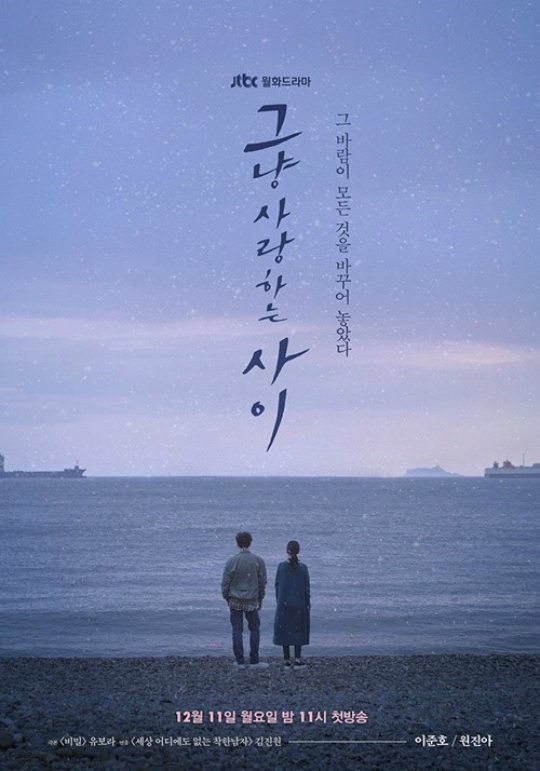
Going back to what I mentioned about the posters, specifically the one above, it felt like a movie. I had mentioned this to my friend, but upon watching the teasers and scrolling through a few images, the biggest thing that piqued my interest was that “it seriously looks like a movie!!!!”. Now, what I mean by “a movie” might sound pretty lame. However, personally, I am not a frequent moviegoer. In fact, I am barely a moviegoer at all. This is because I always felt overwhelmed by the end of movies, regardless of the genre. Movies were always so concise, impactful, and had the ability to leave a really strong, lasting impression within a really short amount of time. That sort of stuff always threw me off; it was just always too much for my brain to handle. Dramas and shows on the other hand, are way more subtle. I get to wean myself into the emotions and storylines, and there is an added level of depth simply due to the fact that they are longer than just an hour and a half or so.
And so, with 그 사이 giving me movie vibes, meant that I felt like it had plenty of room to hit me like a truck and leave me with a few scars, while at the same time, playing itself out as a 16-episode series. The prominent usage of cool colors, mellowed-down instrumental tones, wistful voiceovers, and a cityscape that wasn’t your classic, bright uptown Seoul, but instead a somber yet colorful Busan, all left a very strong, but refreshing first impression on me. It really looked like a movie. Its feats and details looked grand from the get go. It meant that I had a gut feeling that this show was really, seriously, going to move me. And it truly did.
initialization & continuation--
The very first episode, like most first episodes, introduced us to the one thing that this entire series basically revolves around: the mall collapse accident. I don’t want to exactly recap what the first few episodes were about, but more of what stood out to me that made 그 사이 feel much more special than anything else out there so far.
Moon-soo is a hard worker, balancing a lowkey, blue-collared “job” for her family, as well as working as a designer. Aside from the maybe flawed balance of “work” she has going on, 그 사이 decides to show us the mundane parts, too. Clips of her scrubbing the walls, sweeping the floors, building paper models, simply going about the daily rounds in her life. The initial portrayal of Moon-soo accomplished something that many dramas cannot really pull off, and that is that Moon-soo is just like you and me. Maybe not in the same exact occupational way, but she wakes up in the morning, maybe restlessly, maybe a little bit miserably, she does the things she needs to do, she tends to her responsibilities, and she simply carries on her with life. Of course, not everyone can relate to her on an emotional level, but in a way, we can relate to carrying on with our days no matter how hard it gets. We can see that Moon-soo isn’t that happiest soul in the world, but she isn’t oversensitive and extra mopey, either. She reflects a part of us that we can empathize with, to varying degrees.
The most prominent thing that I initially noticed about Kang-doo was his sharp tongue and the fact that he was always getting beat up and walking around with scars and blood stains. At first glance, many would probably assume that he was your classic, reckless bad boy that doesn’t give two shits about the world. And to an extent, that is true. However, we are also fully aware of the kind of ordeals he has gone through, and we could, or at least I could, sort of feel this underlying pain that he carries around within himself. The eternal scars that Kang-doo carries within himself still haunt me to this day. I can’t even begin to fathom, how hard it must be, to carry so much trauma within one’s own mind. I can’t even imagine how hard it must be to have your father die in an accident, to have been buried beneath rubble for 7 days, to have been stuck with a dead body, to have watched him die, to have your mother die promptly afterwards, to legitimately have schizophrenia due to the all these ordeals combined. In short, Kang-doo is fucked up in ways unimaginable to a normal person, but he hides it all away behind his cold eyes in a heavy layer of bruteness and disregard. From the very beginning, I could feel that Kang-doo’s character has so much complexity, to a point where I couldn’t even comprehend how deep the series would choose to dig out from him. I was excited, but at the same time, apprehensive to watch his story unfold. I knew I had to prepare myself for some massive waterworks. This, in itself, was something a drama had never presented to me with before. 그 사이, I could tell, would not be your cliche kind of romance story.
Even the opening, since the very first episode when I saw it, it pulled at something deeper than anything else. It is comprised of still frames of tragic accidents or sites of rubble and such. It is haunting for an opening and it definitely left a huge impression on me. It established a heavy aura that rarely any dramas dare to take on.

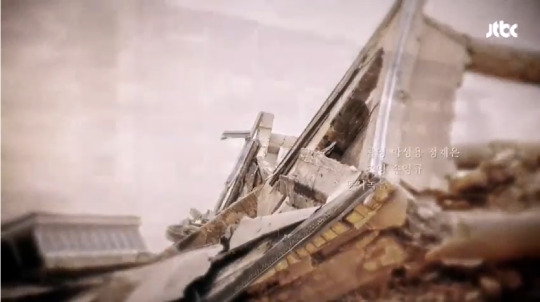
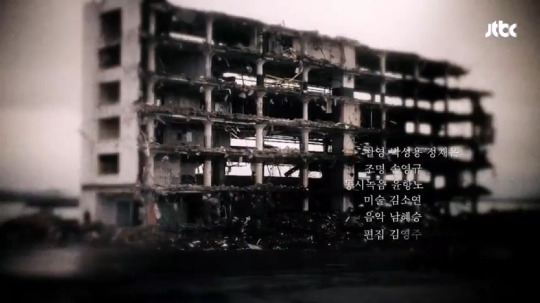


Another random but poignant point that stuck with me was the scene in which Halmoni was smoking, and she passes the cigarette to Kang-doo, who also takes a puff. We only see the back of their figures as they sit on swings, but when they turn their faces to the side, we can clearly see that it is the actors themselves smoking, and not some sort of lookalikes. This left a lasting impression because it almost felt shocking, to watch Jun-ho of 2PM smoke so blatantly like that. Korean media always heavily censors these kinds of things, even if it’s ingrained into their culture like smoking sort of is. Watching him smoke felt kind of scary, in a good way. It felt real, that yes, even someone who is a top idol that sings and dances and has to maintain some sort of pretty image 24/7, can and will smoke. So fun fact: kpop idols are humans, too!
The other characters as well, Wan-jin and Sang-man and Moon-soo’s mom, and Seo Joo-won, Jung Yoo-jin, Ma-ri and Jung Yoo-taek, and Halmeoni played their own special, but very symbolic role as 그 사이 progressed.
Since our introduction to Sang-man, we can get the gist that he is “not normal”. Once again, at first glance, Sang-man looks like a guy who is mentally slower than everyone else. But with time, we get to learn how much more mature he actually is than the rest of our crew, in his own special kind of way. Some of his simplest lines hit the deepest, and although he wasn't exactly my all-time favorite character, I can safely say that he was a hidden gem amongst this web of characters. He is extremely precious, and he shows the audience a beautiful side to being mentally “different”.
Then, we have Wan-jin who contributes to 그 사이 as a figure of immense support for Moon-soo. They share a friendship through their hardships and that in itself resonated really well with me. Throughout this series, we get to see small snippets of how the disabled are disadvantaged and disrespected, too. There is one scene that stands out to me, which is when Wan-jin tells her assistant (idr his name) that she doesn’t want his pity, but she simply wants to be treated like human, like everyone else. Because she is no less a person than anyone else is.
Even Ma-ri, head of the karaoke place that essentially “sells” girls for their presence: at first glance, she is your classic, rich, and manipulative female figure. But underneath that layer of presumable impurity, she is actually the victim of sexual abuse who has worked her way to her place and owes her life to the bravery of Kang-doo himself.
Furthermore, Moon-soo’s mother is more than a lamenting mother who has lost a child, but she is in particular, an alcoholic. Her relationship with her husband has gone sour and she barely manages to hang onto her sanity with the help of soju and Moon-soo by her side. Her mother portrays the agony of a child’s death in such a surreal way, that it only felt right for her to not be okay, in every way possible. She was a complete mess, but rightfully so. Her battle with alcohol didn’t end as just an unsolved addiction, but we were even able to see her enter rehab and conquer herself from within at the end of the drama.
Halmeoni played such an immensely pivotal role in this story. Her words of wisdom sat with viewers even weeks after she said them on screen. One of my personal favorites is “Just because someone is yelling louder doesn’t mean that they are hurting more”. Halmeoni played a sort of role that was like a guardian angel, who was present to give all that she could, until her own time was up. Her sharp tongue and snarky attitude made her likable in the most unique of ways. Because in the end, she was always sort of right. One of the hardest hitting things that Halmeoni talked about was when she was scolding Kang-doo’s sister, saying that it isn’t cigarettes nor cancer nor car accidents nor drugs that kill people. It is poverty. Because a lot of the times, poverty pushes people into these situations. And especially so, it is those in poverty that don’t have the resources to help themselves, in which they are left helpless to die. Halmeoni preached to viewers that poverty is the number one killer of humans. Her departure from the lives of our characters, and particularly Kang-doo’s, left a void that was meant for filling. I will never get over this, but I absolutely love how the show decided to handle her death. We didn’t see any funeral procession or all-black attire or wreaths or a nicely framed portrait. We just saw the aftermath, the broken pieces of Kang-doo and others, and we get to see how they pick themselves back up from all of it. It was a work of art, and it hit much, much, much more deeper than showing us the explicit parts.
All these supporting characters surrounding Moon-soo and Kang-doo indirectly dealt with things like mental health, people with disabilities, sexual assault, poverty, and even alcohol abuse. Aside from the obvious central theme of post-traumatic stress and remembering the forgotten, 그 사이 decided to touch upon these seemingly subtle, but very sensitive topics as well. All these characters were messed up or struggling in some sort of very real way. And it was so, so well done.
The next thing that I absolutely loved about 그 사이 was the progression of Kang-doo and Moon-soo’s relationship. It was simply drawn out so gorgeously. Of course, their fate began in a cliche sort of way, through the accident in which they both lost a loved one. However, this fact was only apparent to Kang-doo for a significant part of their progression. Moon-soo’s inability to remember the bits and pieces of the accident are compensated for through Kang-doo’s haunting ability to recall every miniscule detail, to an extent where he is mentally unstable. Time and time again, Kang-doo asks Moon-soo, what is the point of both of them suffering when only one needs to? This question was raised more than once during 그 사이 and I came to appreciate a sort of two-sided beauty to it. The fact is that, Kang-doo didn’t want another loved one to suffer, but Moon-soo didn’t want Kang-doo to suffer alone. Is it better to suffer alone and hold all the pain in? Or should you share the burden because it may be too much for one to handle alone? This is a dilemma that I resonate with in terms of my very own friends and loved ones. It is a question that we have all asked ourselves at one point. And it is a question that was at the forefront of Kang-doo and Moon-soo’s relationship.
Another thing with these two is that they came to love each other flawlessly. Although this came up before during Joo-won and Kang-doo’s conversation, when Moon-soo asks why Kang-doo loves her, he says “그냥” (just because). And that my friend, was the end of me. The End.
Of course, this definitely was not the only scene in which I cried, but it sure did release a flood of some sort. When posed with this question, the leads of many dramas don’t always list out amazing features of their significant other or anything, and they even say the similar things along the lines of “Do I even need a reason?”. But a one word answer, spoken so genuinely, so lovingly from someone who has gone through so goddamn much, has so much more meaning than a paragraph or an essay or even a book about how much he loves Moon-soo. It hits deeper than mundanely loving someone because they are pretty or accomplished or an amazing person. It touches upon a sort of love that only them two can feel and possess. Only them two, and no one else, will ever understand. And the feeling that this one-word description gave me, was one of a sort of invasion. I felt like I was intruding on something so precious and dear, the fact that Kang-doo spoke “그냥” in itself already felt like much, much more than I already should be allowed to know. I felt like anything further said would just tarnish the beauty of it all. That is simply how real and stunning their affection for each other felt.
Another point that many others could probably agree with is how their physical interactions exuded overwhelming chemistry out of the simplest actions. All they did was hold hands for a really, long freaking time, but it felt a million times deeper than just hand holding. Even when the two finally kissed, there was nothing extravagant about it. The two just genuinely wanted to be with each other. And that was enough. In fact, it was more than enough. I probably sound like a broken record by now, but these two felt so natural and organic together that I almost felt like I didn’t deserve to watch them be so cute and coupley and just in love. The surrealism was overwhelming and it is something that could only come about from stellar writing, and of course, the performances of Lee Jun-ho and Won Jin-ah.
Jun-ho absolutely blew me away. Watching him progress through this drama made me fall for him, hard. Honestly, I sort of want to not even talk about the fact that he is also an idol, too, because the stigma of idol-actors has no place in this drama. Jun-ho literally made himself into this person. Usually, when actors play a significant role, and even when they pull it off really well, I still tend to associate the actor himself with that one character, not in a bad way, but as a form of infatuation (e.g. Ryu Jun-yeol as Kim Jung-hwan in ‘88). Not to say that seeing that actor only reminds me of that one character, but more like, I always tend to see flecks of the character that I can never fully shake off no matter how hard I try.
But for Jun-ho as Kang-doo, this is not the case. I can separate the two, very clearly, too. Of course, as a person, they have completely different personalities and such, but its the fact that I can see Kang-doo existing in this world as well as Jun-ho the actor, idol, and human, too. Because that’s just how well he played it. And don’t even get me started on how multi-talented Jun-ho is as a person in real life, too. The fact that he can dance and sing super fucking well (with countless solo songs and albums to call his own) further blows my mind and raises him up to the top ranks of my favorite actors. There is nothing this guy can’t do. And I just want to mention, he isn’t particularly handsome or anything. To me, it is endless charms and abilities that make Jun-ho such a likable guy. I am absolutely proud to have watched him grow thus far.
As for Won Jin-ah, it was already hyped from the beginning that she was chosen out of “120 auditions” which is indeed a big feat, but I think just further adds to her credibility as an outstanding actress. She has such natural features of expression, and of course, that pure, innocent kind of vibe that is commonly taken for granted among actresses. I am going to be honest here, I am not as good at dissecting female performances compared to male performances, mostly because I am a female myself, but Won Jin-ah fit Moon-soo so well that I truly can’t see her as anyone else. I know that that kind of saying is a bit overused for many characters played by certain actors, but I truly do mean it in the same way I talked about Jun-ho as Kang-doo. She made herself into Moon-soo, in which I can firmly believe there is a Ha Moon-soo somewhere out there working at her mother’s bathhouse and making models, while there is also the actress Won Jin-ah doing her job.
It is just stunning, how intricate and detailed these characters were, and how well they came to life on screen. I can’t get over it, I just really can’t. If I daresay, it was almost as if I was watching a documentary. These two were that real together. It was heartbreakingly beautiful.
Which takes me into the angst realm of 그 사이. Many, many commenters of this drama mentioned how heavy it was, and how it was difficult to watch during hard times and such. But for me, although I admit I am a total sucker for dark and depressing shows anyway, its heaviness weighed me down in all the right ways. It tugged at the right corners of my heart, to a point where for the first time ever, I literally bawled my eyes out because of something beautiful.
It is pretty hard to explain, how I felt as I watched their lives unfold. The most prominent feeling, of course, was sadness and pain for when the characters themselves were in pain. Sometimes, I could feel the pain physically in my chest, and I wished until the end of the world that everything could be okay. But at the same time, when things just seemed to happen at the right moments in time, when their fingers seemed to intertwine at all the perfect angles, I weeped like there was no tomorrow because have you ever seen a couple so beautiful before? I haven’t, I really haven’t.
Anything that heals must have been hurt before, too. And that is Kang-doo and Moon-soo. They provide each other with a sort of healing that only they can feel and understand. While one radiates pain and suffering, the other absorbs it all and folds it with love into the layers that is their relationship. I agree to an extent that their occasional back-and-forth-ness got a little bit out of hand, but I also see it is as a sort of apprehensiveness. That these two loved each other so much, that they wanted to avoid hurting the other in any way possible.
So as much as their agony from the unfortunate events in their lives caused, and as much as they cried themselves, I cried along with them, the entire way through. And when there were those small, gorgeous moments of the light shining through the cracks for just a little while, I still cried. Mundane moments reflected something so much deeper than any viewer can feel on their own accord. Crying a shit ton during a show probably sounds like a negative thing, but for me, it simply shows me how much 그 사이 moved me. It moved my soul to peer into places deeper than the deepest places of my imagination. Even when I was simply walking to class in the middle of the day, I got choked up just thinking about Kang-doo and Moon-soo and how everything might unfold before them, for better or for worse.
Everything that happened between Kang-doo and Moon-soo felt so raw with emotion. Each line spoken to each other was purposeful and wistful. There really never was a dull moment between the two. The way in which some of the scenes were shot, the camera would shake in the slightest. It made it all look so brutally realistic, as if we were really there, privy to their thoughts and secrets and feelings.
그 사이 literally took over my life for the weeks that it was airing, and although this obsessive enthusiasm wasn’t exactly new to me (Healer & Reply ‘88 both accomplished this), it pushed me to ask why this show had the ability to do so. I honestly don’t think words alone will ever fully be enough to explain all of the pure beauty in 그 사이, but words are all I have at my expense.
silhouettes & hands & ice cream & carrots--
These are the small things that made this drama all the more ethereal. The cinematography and the way the sunlight hit the camera at certain angles, it literally printed itself onto my brain. These frames were magnificent and nearly struck a tear in my eye each time. The usage of silhouettes as well, was so, extremely well done here. I have no words.


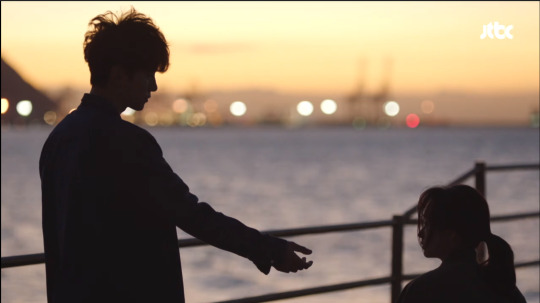

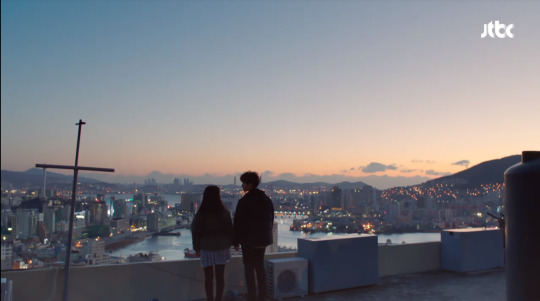
One of the biggest things that also stood out significantly to me, although maybe not that big of a deal, but definitely worth a mention, was how well her hand fit into his. I have never felt such a swell of emotions through people simply holding hands. I swear to god, it is as if their hands were made for each other. Her hands are perfectly smaller than his, which means his covered them effortlessly. “You were born to be loved by me, right?” asks Kang-doo. Some of his lines were honestly so cringey, but Jun-ho pulled them off so well, they seriously sounded really natural to me. 100% cute and 0% corny.

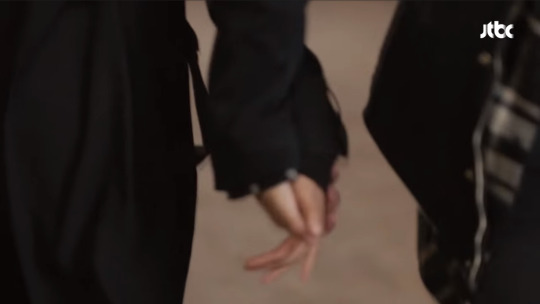

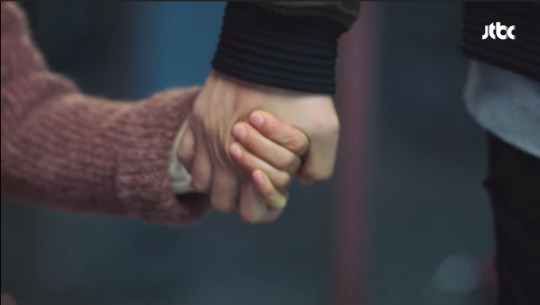
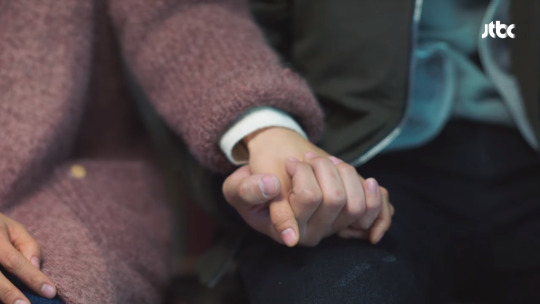
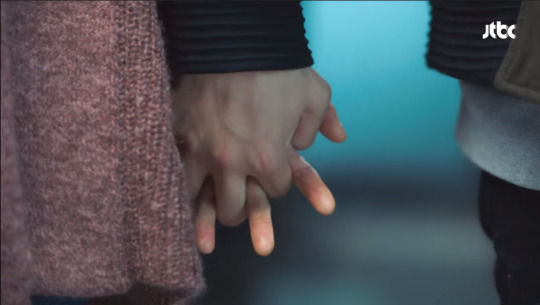
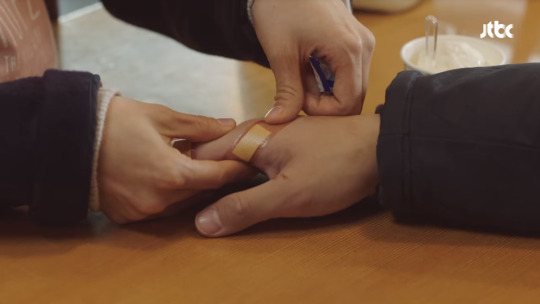

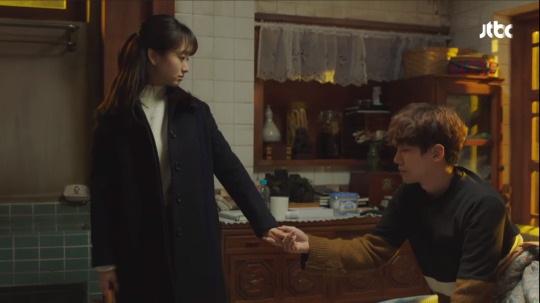
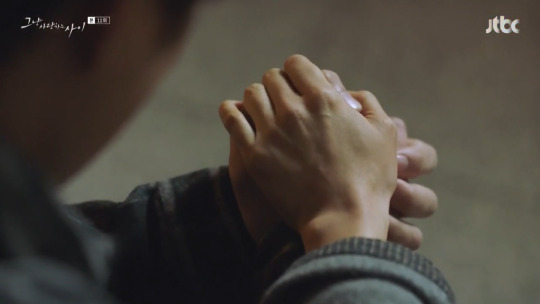
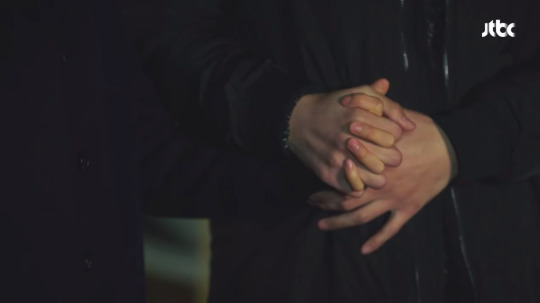



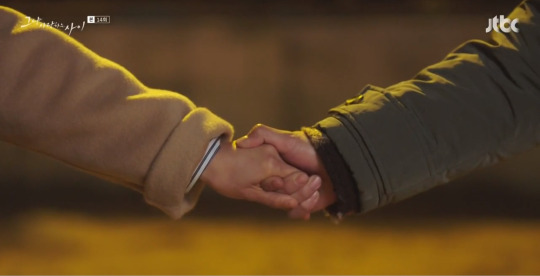
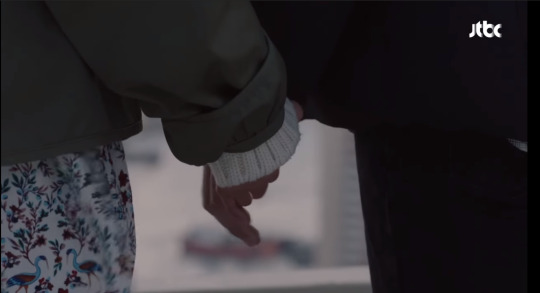
And of course, the iconic ice creams. The fact that by the end of the drama, Moon-soo herself actually likes ice cream, too, can it get any cuter. To add to the cuteness, in real life, Jun-ho is ice cream obsessed, always posing with it, talking about it, even writing a song about it, and of course, eating it. I feel like the symbol of ice cream was sort of like Jun-ho’s piece to take from Kang-doo. It is like a part of him that he gave to his character, to fully make it his, but not exactly him.
The carrot is iconic because of the one line we can never forget. The line that Moon-soo meant, but didn’t really mean at the same time. The line that sputtered out of her mouth in a funny, exasperating way, but also in a meaningful, deeper, heartfelt way. Me too, Moon-soo, me too. I like a man that eats carrots, too.
thank yous & i love yous & geu sa-i--
This motif was quite a prominent one, but after thinking about it more, I started to realize the sort of message the writer and director were possibly trying to get at. The “i love you”s were touching and cute and everything, but the line(s) that got to me the most were not those three stereotypically monumental words, but it was the “thank you”s that cut deeper than most. How many dramas have you watched where the couple consistently thanked each other? And what kind of meaning did those thank yous hold? In 그 사이, Moon-soo and Kang-doo exchanged genuine, heartfelt thank yous.
The thing with these thank yous though, is that they have a multitude of meanings. “Thank you for picking me up today.” “Thank you for calling me.” “Thank you for being there for me.” “Thank you for loving me.” “Thank you for being you.” “Thank you for staying by my side.” “Thank you for being alive.” I could go on and on, but you get the point. These thank yous meant the universe to them, they relayed a sort of gratitude and passion and sentiment that only these two could feel and share. It all just felt so organic.
Next, I want to discuss the “trope” that 그 사이 utilized in which Kang-doo was fighting for his life towards the end of it all. This part was excruciatingly painful to watch, mostly because I honestly couldn’t tell how they were going to end it all. Nor could I really understand what sort of meaning each kind of ending could have. If they ended it happily ever after, why? And if not, what else were they trying to say? I just couldn’t tell.
Kang-doo was suffering from a failing liver, and I think it only made sense. From day one, he is depicted as reckless, especially towards his own body. A comment somewhere on Dramabeans stated it nicely: “Grandma kept telling him to stop taking [the painkillers] and to let his pain out instead, and with no granny to give him placebos, he ended up taking real, strong painkillers.” I feel like 그 사이 toyed with Kang-doo’s life as a sort of reality check, that shit goes on, no matter how good or bad everything seems to be turning out, shit still goes on. But by saving him, of course, maybe they are telling us that miracles really do exist. Most importantly, they don’t forget to remind us that these miracles may come at the expense of others’ own misfortunes.
And if anything, the dragging out of Kang-doo’s potential death left room for the supporting to characters to come out and shower Kang-doo with love. I can’t remember the quote exactly, but it was when the doctor asked Jae-young what kind of person her brother was, that so many random people were coming forward to readily donate a part of their liver as if it was no big deal. But Ma-ri countered wonderfully, that it is a serious decision to make, which is all the reason why it matters so much more. It was super duper heartwarming to see everyone try their best, in any way, to help Kang-doo and just have him live. I feel like giving us the most plausible hope of Sang-man specifically, was symbolic in which he, of all people, literally the most profound, but possibly most childish person out of our entire bunch, would be the one to save Kang-doo. But it also felt brutally realistic when they suddenly took him away as a donor because life just doesn’t get to work out perfectly like that all the time. But also with last-minute miracles, life kinda does tend to work out at the perfect times. Life is luck? Maybe.
But the ending scene, that goddamn, fucking gorgeous ending scene. I don’t even care if people whine all they want about how ending with a kiss scene is cliche and overrated, just leave me be to pick this one apart. In fact, the part that got me the most choked up wasn’t even the kiss itself (I mean, it partly was), but it was the dialogue, the eyes, the expressions, and the voiceover that got me wailing like a drowning beluga whale in the middle of the Atlantic ocean. Like smack dab in the middle. Wailing incessantly. That was me.
Because here is the thing. First off, we pan into a frame that overlooks the Busan cityscape as the sun is setting, the bright houses are subtly flashing their hues, the horizon is glowing all sorts of reds and blues and pinks and oranges and purples, and our couple’s silhouette is situated perfectly at the center of it all. Literally, just that still frame of that scene itself, took my breath away. Stunning cinematography at its finest. Moon-soo tells Kang-doo that she loves him, which we haven’t gotten a chance to hear after all the times he’s already told her the same. But here she says it and her eyes are literally glowing, and his eyes are peaceful yet joyous at the same time, the most comfortable, and just the most at-home I have ever seen them throughout the entire series. And then there is a really long pause with no dialogue, no sounds, no loud blowing, just a blank, subtle, empty noise, as he cradles her face which somehow just manages to fit perfectly into his hand, and then Kang-doo’s voice breaks through the ever-so-slightly prolonged silence, and he narrates “Moon-soo loves me”.
I will repeat that just in case you couldn’t read it above: “Moon-soo loves me”.
The impact that this one simple line had was massive, colossal, unimaginably poignant, and it hit me. Deep. This one line, I feel, gave validation to this entire show, to all our hours devoted to watching it, to the characters’ actions, and most importantly, to Kang-doo’s life. Throughout the entirety of 그 사이, he is literally battling for his life, not only physically at the end, but emotionally and mentally as well. He very much lacked that spark of purpose, the thing that made him live. Not to denounce his worth and say that now his life only boils down to Moon-soo’s love for him. It’s more like, she gives him another beginning. Kang-doo states this eloquently when talking with Seo Joo-won on the roof about why he loves her. “Just because”. He continues, “I was a man that could only live by the day. But after meeting her, I was curious about tomorrow”.
And so “Moon-soo loves me” is so pivotal in which Kang-doo has mostly, hopefully relieved himself of all the shit and guilt and trauma and struggles that he has been fighting from within, and all he needs in his life to keep going is Moon-soo’s love. This line is followed up with a “The fact that we are alive… it is a relief.” How fucking beautiful is that.
And now, this is where I can come full circle to the title of this drama, “그냥 사랑하는 사이”. The English of this has been commonly translated as “Just Between Lovers”, but as you can tell since the beginning of this composition, I do not prefer to use that title, for several reasons. The main one is that, well, sometimes there are things in other languages that you really just cannot translate. “그냥 사랑하는 사이” is one of them. The meaning that it has in Korean, the feelings and implications that it carries with it, simply cannot be translated into the English language. If I wanted to try, it would be something along the lines of “just your average, simple relationship between two people that love each other”. Which still sounds pretty stupid in English, but with those extra strands of meaning, and even more added depth, is what the Korean title holds. Also, for simplicity’s sake, Korean phrases tend to be condensed into acronym-like words. In this case though, “그냥 사랑하는 사이 (geu-nyang sa-rang-ha-neun sa-i)” as an acronym-ish kind of word is simply “그 사이 (geu sa-i)” in which the “냥 (nyang)” and “사랑하는” (meaning “loving”) are removed to now signify something along the lines of literally: “that relationship” or “a relationship”. “그” is used as sort of an article, I guess, meaning “that” or “a”, or basically anything not really specific like his or hers or yours. **I have never learned Korean formally, and everything I’m saying is legitimately self-taught, so please don’t quote me on any of this, but I am just trying to get my point across as best as I can LOL** This all boils down to how, to me, “그 사이” is so simple yet touching and moving and so full of meaning, that it has this sort of immense, hidden beauty to it. Not only is it, in this case, a shortened version of “그냥 사랑하는 사이”, but “그 사이” as a phrase in any context is seemingly mundane, but carries so much more than meets the eye.

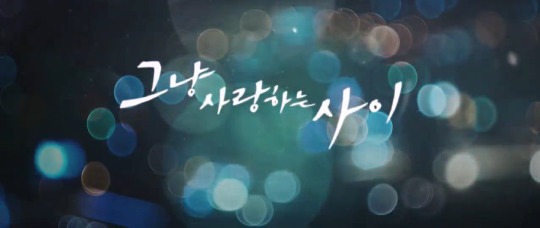
Just like, you know, a relationship. But not actually. The love part sounds simple enough, and it is. They love. But how they came to love, what it means to them, contains a meaning so deep and intricate that, maybe, just to make things easier and to even preserve its profound beauty that we will never understand, we will leave it as... just a relationship.
And I find that incredibly moving. I am struggling right now, to type down my feelings, but I hope that it is working to an extent. For the first time ever, a drama’s title actually seemed to fit, in less of a relevancy sort of way, but in much more of a meaningful, heartfelt way. The title of this drama is so short, so plain, almost boring-sounding, but it encompassed so much more than that. It encompassed an entire, full relationship of two people that come to love, or even more than love, but live, through pain and deaths and guilt and hardships and tears and growth and interdependence, and just each other.
There is an infinite amount of complexity hidden within the seemingly thin and obvious layers of 그 사이, and I think this is what is at the center of its ethereal beauty as a show for viewers to absorb. The words behind the characters’ actions and the events that occur carry immaculate weight, that it makes you question things, maybe even about your own life. This is a sort of art that I have never, ever seen a show demonstrate, and it completely took my breath away. It left a million pieces of my heart shattered on the floor. I literally feel like my life has changed, even if just a little bit.
Which now brings me to the things that this show wanted to tell the audience. When commenting about 그 사이, many people tended to say something along the lines of “It had great messages, it was so deep, etc.” and yes, I agree with that, too. But nowhere did anyone actually say what those messages were. I feel like there is an infinite number of lessons 그 사이 wanted to teach us, but I’ll try to point out the more noticeable ones first.
think about this--
Remember the forgotten.
Awareness is one of the strongest forces, because knowledge is power. I feel that, amidst people’s ordinary lives, we sometimes forget to remember those who simply never had a chance to live. We all live so voraciously and fervently, but it is important to be aware of that fervor that couldn’t be. Some people questioned the intent of leaving out the final product of the memorial that our two leads were working so hard on throughout the entire show. One commentator wrote simply: "In a way, it gave cadence to the idea that the memorial wasn't for the public or even us as the viewers. It belongs to the victims and the survivors of the tragedy." Very well articulated. Nothing more is needed.
Poverty kills.
I touched upon this one a little bit in the above text, but here, I’m just going to lay down Halmeoni’s entire spiel because no could have said it better than her.

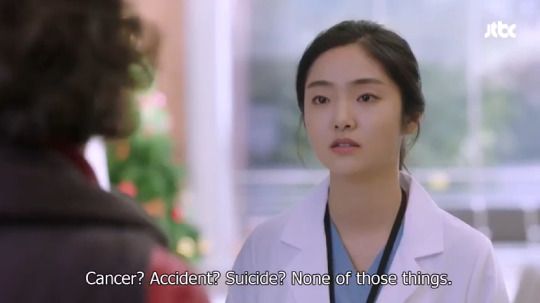


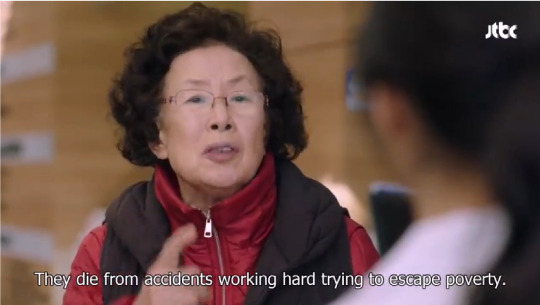

Mental trauma is in its own way, more painful than any physical sort of pain.
Jun-ho demonstrates this so hauntingly and beautifully through his acting as the broken Kang-doo. In an interview that Jun-ho had after wrapping up filming, he says, "I didn't know what these people thought. It's something you won't know if you haven't been through it. You have to experience pain to know what it feels like. So I didn't even dare to try to understand them. I just used my own method of shutting myself away”. So much personal heart and character lies within those words, making his performance even more credible and noteworthy. Here is a line from the wise ol’ Halmeoni that hits pretty deep.
Never take life for granted.
I feel like this sort of message has such redundancy and insensibility in common-day life, but it is a reality that 그 사이 brings to life gorgeously. These characters are struggling in the depths of their own despair on a daily basis. But in the end, we get to see them prevail in some sort of way, with the help of each other’s sheer existence. In the same interview, Jun-ho says, “You don't take things for granted. Every little thing from the sun and wind, is important.” It is so poignant, to see the actor himself connect so deeply with the plot and depth of the story itself. The ending scene of 그 사이 paints this message in the air and the wind, from Kang-doo’s very own voiceover. He says, “Because we survived… it’s a relief”. And that’s it. That concludes the entirety of 그 사이. What huge punch to the guts that line was. It was so bold, heart-rendering, and just true. It was true, that the simple fact that we are living our own lives, sad or happy, good or bad, pain or not, we are alive, and that is all that matters in the end.
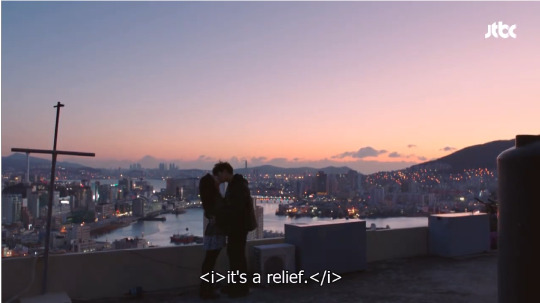
words & frames--
In addition, I want to include a few more lines (that are conveniently included within the beautiful OST MVs produced by El Music Studio) that struck huge cracks into my soul as they were spoken aloud on screen. Honestly, these lines sound much better in Korean because there is a sort of depth that an English translation isn’t able to capture, but that is okay. English will just have to do.

“Misery is just... being miserable.”
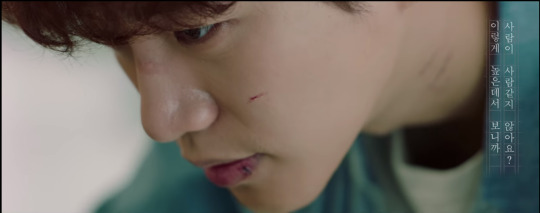
“Looking down from such a high place like this, people don’t really look like people anymore, do they?”

“Just because they are crying more loudly doesn’t mean that they are hurting more.”

“Him distancing himself that much shows how much he actually cherishes you.”
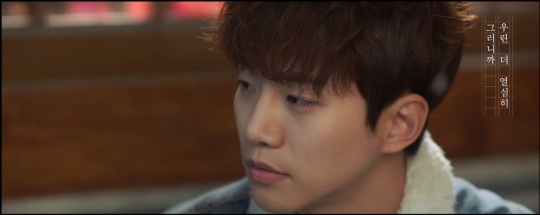
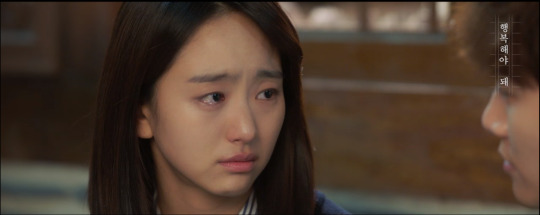
“And so, more than anyone else... we must be happier.”
An extra note about the OSTs: none of them stood out enough for me to add to my music library, not even Jun-ho’s very own (as much I love his gorgeous voice). However, I can confidently say that they added a haunting effect to many of the scenes and portrayals throughout the show. All the voices and quiet, heart-tugging melodies that meadered its way between the dialogue and echoes, created some intense emotions that probably would’ve been empty otherwise.
noticeable hair-growth & flaws & final wrap up--
One of the things that I really came to notice by the end of this show was that the characters’ hair had grown significantly. I mean, this is a given. Hair grows over time. Duh. But aside from the fact that it’s an obvious naturality. I found to love how it added to the realism in 그 사이. The fact that by the last episode, Jung Yoo-jin’s hair was almost reaching her shoulders, Seo Joo-won’s was creeping towards his neck, Moon-soo grew out her bangs and swept it to the side, and Kang-doo’s covered his eyes a little more than usual, was just a touching sight to take in. Look how human they are! Their hair grew properly, following the time sequence of the series itself. How beautiful is that. It’s such a subtle, minor detail, but to me, it really stood out as an aesthetic touch to its already-brimming-with-reality depiction that 그 사이 establishes.
I could be biased here, but I want to say that 그 사이’s biggest fault was that it used supporting characters like Seo Joo-won and Jung Yoo-jin. Not to say that their roles were completely useless or detrimental to the plot, but more like, their roles were underdone amidst the medley of such a strong leading pair mixed with the other complex, unique supporting figures. Although Jung Yoo-jin thankfully did not play your classic, snooty second female lead vying for the main man, Seo Joo-won very much fell under this category, in his own male-ish sort of way. I honestly did not really appreciate some of his actions and words. I felt like his character was lacking the depth and charm that the rest of the cast hones in on so well. The writers really could have given more to work with, but with such bland lines and cliche intentions, I just couldn’t find myself warming up to him. Aside from parts of Joo-won’s incompleteness as a character, I guess another flaw could be the classic kdrama tropes 그 사이 utilized. As minimal as they were, some were there regardless. The wrist grab, the mid-fall waist catch, the eavesdropping behind a wall, and all of that cliche mush you could find in 1897957 other kdramas, were definitely present in 그 사이. But whatever. It was fucking beautiful anyway.
Finally, I want to address the last part of this clean finale that 그 사이 managed with ease. In particular, it was the montage of the familiar locations that we have gotten to see since the beginning. Externally, it looked plain and a little bit sad and empty. But I feel like these stills offered us so much, because these locations were more than places that our characters frequented, but they are perpetual within their spaces of time. These places, those sort of “places that you can always go back to no matter what happens”. Places of rest, of heart, of everything else that has and could happen. At this point I’m basically just rambling, but my point is that. It was breathtaking.



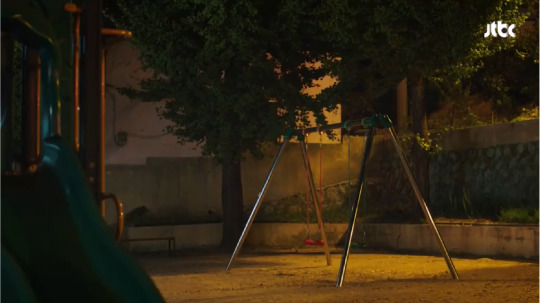

Also, let us just take some time to appreciate these real Busan visuals.
To anyone that has read this far by now… Wow. Just so you know, you have read through an entire 5-month journey with my thoughts LOL. It is almost May now and my life has been too much of a mess for me to be able to post this within one sitting.
Many days have passed since I last finished this drama and wiped my tears off my face and blew my nose into a soggy tissue and gazed awestruck into the beautiful skyline on my laptop screen. But my feelings remain the same, and this series has held such a special place in my heart. When talking about Korean dramas with friends or acquaintances I try to sound nonchalant about 그 사이. Because, you know, it was just that one show that lowkey changed my life. 그 사이 made me feel things and taught me things and provoked thoughts that no other show ever has in my life. I really could care less about what the general public had to say about 그 사이. I just know, I loved it with all my heart and soul. Thank you for everything, 그 사이.
#그냥 사랑하는 사이#just between lovers#rain or shine#korean drama#kdrama#review#lee kang doo is my bb 5ever#can they just get married ok#this drama stole a piece of me#love times infinity#i have exhausted all my words#see yall in my next rant (":
43 notes
·
View notes
Note
What do you mean that you are an Empath?
Before I delve into the metaphysical concept of Empaths, I should clarify the different kinds of empathy. To be honest I’m still pretty new to being an Empath and the related community and research. However, I do know about some of it as the development of empathy often comes up in relation to trauma. How a person experiences empathy can develop and/or change because of trauma and usually does. Anyway, there are two main types of empathy. James Fallon, a neuroscientist and an expert on psychopathic behavior summarizes them as (X):
“Cognitive empathy is the ability to know what other people are feeling, and emotional empathy is the kind where you feel what they’re feeling.”
Social predators like narcissists and psychopaths tend to develop cognitive empathy as it allows them to blend into society, wear a convincing mask, and identify potential targets and their vulnerabilities. I wish I had known about this type of empathy a few years ago. For so long, I thought my twin brother was an empathetic person. He said that he was, and he acted the part. But in hindsight, he never was. It was all an act. When I’d come to him, drowning in pain because of our parents’ abuse (in particular our father’s), he’d tell me to just get over it. That I had a victim complex. We really are the perfect, fucked-up yin yang twins. He’s darkness, and I’m light. He knows what people feel, and I feel what they feel.
So, neurotypical people have a normal amount of emotional/compassionate empathy. They can pick up on what another person is feeling and want to help. In my AP Psyche class, during our feral children section, empathy was actually listed as one of the two defining traits of humanity. And then there are what I call Empaths with a capital E. These kinds of people have emotional/compassionate empathy to a high degree, a hyper empathy if you will. From what I’ve read, Empathy is something that’s more genetic in nature. Hyper empathy can also stem from trauma, as interpersonal abuse conditions you to your abuser’s moods. My father, and my mother to an extent, was very mercurial. My father was a volatile man who would do things like throw shit at the wall and damage doors. I had to learn from a young age how to read him. So I’m very sensitive to a person’s face, tone, and body language and how they change.
Anyway, being an Empath means that I feel people’s emotions and their overall energy/aura. It can be very overwhelming. One of the first times I noticed it was when I was catering an event on my campus last year. It was a dinner at the President’s house, so everyone was running around stressed, including myself. But the moment I went downstairs to the employee bathroom, I felt calm. It wasn’t my stress that I was feeling. However, I really became aware of it because of my paranormal experiences last year. I’m in my school’s Paranormal Club, and last year we visited an old restaurant and Gettysburg. The restaurant had some construction dating back to the Revolution, and in the dirt-floor basement we got some EVPs (electronic voice phenomenon; ghost voices). (One of the EVPs was actually an unidentified male voice saying, “No,” to my question of, “Did you die here?”.) In the basement, I suddenly began to think of these Civil War spirits that were reportedly seen, and I grew emotional. I had a knot in my throat and water at the edge of my eyes. It was odd. Then later that month we visited Gettysburg for a weekend. On our first night we went to Sachs Bridge, a place known for its activity. I watched a cigarette re-light itself, felt its cold back end after it eventually went out (as if something cold had held it), and then watched said cigarette move by itself when set on a railing. (And no, there was no wind that night and especially at that moment.) By the riverbank, as we were asking questions to the air (and hopefully ghosts), I began to feel sad emotions out of nowhere, like I had at the restaurant. Feelings of sadness, of yearning. Tears welled up in my eyes and slipped down my face.
And these excursions were last April. Back then I was still pretty numb and dry-eyed, as I was just starting to heavily process the abuse. After Gettysburg, I talked to @bethgreenewarriorprincess and a college friend about it, as I was considering that I was an Empath. The emotions that I had felt on those excursions weren’t mine, I couldn’t trace them to a specific trigger. My friends validated the possibility, especially after I mentioned my mother’s connection to the paranormal. She told me that the women in our family saw things. Her house was haunted by her mother and her uncle, and she would see shadows and figures move out of the corner of her eye. So I inherited my mother’s sensitivity, but mine was different. Rather than seeing I feel.
Overall, Empaths tend to attract toxic people, damaged people, and ghosts. Empaths are known for having a naturally healing aura, and we also like to help others. We’re fixers by nature. Anytime a friend of mine expresses distress I feel the urge to drop everything and jump to their side, to nurture them. Burn-out is a big risk with Empaths, from what I’ve read, and I can believe it.
My empathy has really grown in the last few months. Being abroad really helped to open up that part of myself, which was likely warped and stunted because of my family. Europe’s old architecture tends to affect Empaths as they have more energy because of the history. I would often be overwhelmed in cathedrals, actually, as this reverence and power would wash over me. It helped that my two closest friends that I made in France, @boldly-qo and @teachers-are-nerds, are also Empaths. We supported each other. boldly-qo and I were housemates, and we became French sisters. They have more experience with being an Empath and the paranormal, so they helped me embrace this side of myself.
I had my first personal paranormal experience about a week ago, during finals. I woke up one night at 3 a.m., and I kept hearing a clicking noise in the corner between my window and the door. I remembered that boldly-qo had looked for ghosts earlier that day. I sensed something in the room with me. It wasn’t malevolent, just a presence. The next day, after I mentioned it to boldly-qo, they mentioned seeing an orb. Orbs are common with ghosts as they require the least amount of energy. (Full-body apparitions are actually rare because of the energy that a ghost would need to generate.) The next night, right after I turned out the lights so I could go to bed, my overhead lamp started to flicker. While there had been electricity problems at my host’s throughout the semester, my light had never done that. And the flickering light moved around on the ceiling lamp. I thought that there was a presence in the room, so I got boldly-qo. They also felt something, something non-malevolent and likely female. The room wasn’t cold, but there was a cold energy and I also felt a heavy weight on my shoulders and chest.
boldly-qo had a spirit box app on their phone, and so we used to try and communicate. For socio-historical context, our host’s house was built in the 20s and during the 40s, Nazis lived downstairs. I stayed in Aix-en-Provence, and there was a concentration camp outside of town. From what I’ve gathered, spirit boxes are a relatively new kind of tech in paranormal research. Ryan uses them a lot on Buzzfeed Unsolved. The device/app scans radio frequencies at an extremely fast rate, generating a large amount of static and white noise. It’s so fast that, in theory, any voices heard can’t be human.
We learned three things while using the spirit box app: The spirit was a woman named something like Milfred (I think Mildred, as my great-grandmother had the same name), she didn’t live in this house, and she didn’t like being there. Grief and sadness overwhelmed me, and I started to cry, outright sobbing at one point. As I told boldly-qo, those emotions weren’t mine. They held me as the feelings ran their course. It felt like Milfred had left. I felt closure.
That night, boldly-qo dreamt that a soldier had killed them and took their family away. I think that we helped a spirit whose family was taken to the camps. Maybe she was drawn to the house of her killer. We know that Milfred was likely drawn to me and my energy – I’m grieving the loss of my family right now. We’re kindred spirits in a way. While I was frightened at first, because there was a presence in my personal space, by the end of the experience I felt empowered. It was beautiful being able to help someone who was suffering, to let a person know that they were seen.
I know that this is a really long and personal post, but I didn’t know how else to answer your question. It’s taken me about a year to internalize this part of myself, and it can be a hard concept to understand if you haven’t lived it. It’s a bit surreal and really connects you to the greater universe, to a sense of spirituality.
6 notes
·
View notes
Text
House
Nouns / phrases: Home (life), home country. Family (members).Privacy, private affairs. Establishment, settling down. Familiarity, familiarization, (nonsexual!) intimacy. Close-mindedness: fear of the new/unfamiliar. Xenophobia. Order, regularity, simple structures, plans, low risk, safety. Normality, conventionality, tradition(al views), conservatism. Confirmed habits; matters of habit. Preservation, conservation. Restrictive traditions; blocking of innovation; inflexibility. Activities: To make oneself a(t) home, start a family. Activities at home or with the family. To settle down, settle with, establish. To keep something private; keep away the public. To familiarize, be used to, be at home with. To block innovations/changes; fear the unfamiliar, keep out strangers. To order, regulate, keep it simple, plan, reduce risks. To feel safe. To follow tradition, conserve, preserve. To act habitually. Attributes: Homey/homelike, native. At home (with). Familial. Long established, settled. Private, intimate, familiar. Close-minded regarding the unfamiliar; xenophobic. Proper, orderly, normal, regular, regulated, simple, simply-structured, well-planned, low-risk. Habitual, conventional, traditional, accustomed. Conservative, conserving. Restrictive, inflexible, anti-innovative. As a person: Person with the above attributes, esp.: traditional, conservative; strict - doesn't bend the rules. Person with very confirmed habits. Family member. As advice: Keep it private! Familiarise yourself with it! Settle down! Preserve that which is good!
Negatively: Don't block innovation; let the unfamiliar in! Time factor *) : Long time spans; always; forever. When it usually happens. Family time.
About the meaning: While my interpretation of the House starts with the place we call our home, the theme which connects all the House's meanings is "familiarness". Familiarness is implicated in all the following dimensions of meanings, not just in the one where it is explicitly mentioned. Home / family / privacy: For me the most obvious meaning of the House is "home", and anything which has to do with our home life, our housing situation, our household. Furthermore, the House can mean that we feel at home somewhere or with something or someone, that we are comfortable with something. Along a similar line I have also interpreted the House as settling down with or settling for something. Furthermore, the place people call their home more often than not also houses their family. So the House is the card which represents our family - our family of origin as well as the family we have started ourselves, and in some contexts the House may also represent specific family members. Slightly more abstract but very useful is the interpretation of the House as privacy. In that sense the House can stand for anything which is commonly considered private or which we desperately try to keep private. Familiarness / normality / fear of the new: In our home we are surrounded with what is familiar - or, put differently, we only feel at home at a place we have intimately familiarized ourselves with. So this is something else the House often signifies: familiarness, familiarity, intimacy (in a non-sexual sense) - anything which is so familiar to us it seems "normal", things we are very used to, anything which is long established. And in some cases, the House seems to indicate something more than just that. Sometimes it suggests a specific type of closed-mindedness: an aversion to that which is unfamiliar. The House can suggest that we discard or negatively value something simply because it is new or unfamiliar. In extreme cases, the House can even hint at xenophobia. Order / plans / safety: In every home there is a certain order in place. I'm not talking about cleanliness here, I'm talking about the regularities, about the simple structures which everyone in a mutual home lives by (not necessarily happily!). So this type of order - regularities and simple structures - are also part of the House's meaning. Furthermore, I sometimes read the House as plans. For the plans we make organize and regulate our lives, too. They are guidelines for our (future) behaviour which we willingly establish for ourselves. And because order, and having a plan, make us feel safe (and may actually lower the risk of unwanted outcomes) I also sometimes interpret the House as actual or perceived safety - safety especially in the sense of a low risk factor, or in the sense of "nothing threatens the established order". Bear in mind that the House doesn't necessarily say that these are productive things. For example, we might be so fixated on the plans we make that we can't (re)act spontaneously anymore. Or, an inability to take calculated risks, a compulsion to always choose the safest option, might be hindering us to live life to the fullest. Tradition / confirmed habits / conservatism: Closely related to the last paragraph is the issue of conventionality, tradition and, on an individual level, habits. The House may represent a traditional world view, anything that is conventional, or certain traditions or customs themselves. It stands for things we claim "have always been like this!", for that which we view as "proper". And the House can represent our individual confirmed habits, too, habits so ingrained they seem like laws of nature to us. Put in slightly different words, the House represents conservatism - a mindset which seeks to preserve things as they are. Now, conservatism, traditions, and habits, can be helpful. When we preserve things as they are, the resulting continuity makes us feel safe. Traditions serve as guidelines and anchors in difficult times of transition. And strong views on what is proper reduce complexity - they make it unnecessary to think about everything anew every time. But the House might also be a hint that tradition is keeping us from living our lives according to our individual abilities and needs. Strict conservatism can hinder us to make life better because we block innovation. And confirmed habits can make us very inflexible, hogtying us in unfamiliar situations where they don't work.
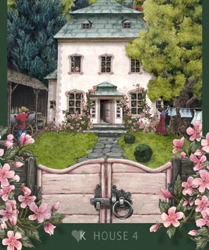
About the Image: My illustration of the House hopefully speaks for itself. A house (not very large, quite obviously a family home) nestles among high trees at the back of a private garden. Because the House represents family I couldn't resist adding a tiny father, mother and child. And because the card represents tradition to me, conservatism, I gleefully painted the father busy with the carriage, and the mother with the laundry. The child is safe inside the house, waving out of the window. Yes, on the card the figures are so tiny that you can only guess what they are doing. But after all, while I think their presence defines the house more definitely as a lived-in home, they are not what the card is about. The closed gate with its big latch wasn't on my first sketch of the card. But I only felt satisfied with the image when I added it. Without it, the house seemed too accessible. I wanted to stress that this card is about private affairs, and about keeping not just the public out but also change and the unfamiliar. So now, once you are inside the gate you're welcomed: the house's door itself is open. But as an outsider, you're kept at a distance by the closed gate. The roses on the gate and also on the house's walls I included not as a representative for familial love. Instead, I added them because I felt they introduced a certain drowsiness, an almost "Sleeping Beauty" aspect to the illustration. Everything is in stasis, maybe pleasantly so, but nothing ever changes.
House-Rider Invasion of privacy, home invasion. Fear of someone or something who/which is unfamiliar. Something or someone new or unfamiliar comes into the family / changes traditions / interrupts the life we are used to. Something which disrupts comfort. Change of rules (is needed). Forced change of plans. Yesterday's news. Someone comes (back) who we know very well. To be used to being pressured. Pushy family member. Pushy family. To be comfortable with change. Changes in the home/family. Change of habit(s). House-Clover To have no or few family responsibilities. To consider family matters unimportant. To take rules or tradition not very seriously; to be unburdened by considerations of what's proper. To be happy enough to settle down with the small joys of life (to not need anything big or grand). Familiar humour. Family member who is happy-go-lucky - has gambling issues - doesn't do their bit. To not follow a plan conscientiously. Rules which apply to gambling/risk taking. Conservative approach to anything which looks even faintly like a gamble. House-Ship To leave home, to move to a different place. To turn away from tradition and do things in a new way. To start new traditions. Conflict between wanting the comfort of familiarity and wanting to go explore the unknown. To be familiar (and comfortable?) with exploration, with the process of making new discoveries. To have a habit of leaving. To be used to someone's absence. To plan a journey; to plan a change. Mobile home. Holiday home. To find the structure of what is still unfamiliar. A family member who has has left - or who goes a different way than the rest of the family. An absent family member. A family member who doesn't commit (to the family). Someone can't commit to starting a family. House-House*) Family traditions. Established/familiar rules, established/familiar customs. To be very, very set in one's ways. Comfortable home. Privacy within the family. To settle down in one's home or in one's role as [mother, father, sister, brother etc.]. Ordered home/family life. Conservative plans. House-Tree Tree house. To live close to /in nature. To feel at home in nature. To be firmly rooted in one's family or in tradition - to find stability there. To settle down where/with which we feel safest and most grounded. Healthy family. Growing family. To be very comfortable in one's body. Physical traits we have inherited. Rules or habits concerning our body/health related issues. Our ancestors. To be rooted in the past (possibly not a good thing). To find grounding in tradition. Conservatism makes us unable to welcome innovations or anything unfamiliar - inability to adapt to change. House-Clouds Unclear family situations (e.g. concerning parentage or paternity); secrets within the family. To fog/veil private matters. A habit of pretending, or keeping things secret. Unclear rules. No plan. Uncertainty if we should stay in our home / start a family. Feeling of disorientation because we are not firmly rooted in a tradition or have no rules to live by. We feel unsafe, can't feel the connection with our family and close friends. No tradition or customs which could function as guidelines. No familiarity; to not recognise something or someone. House-Snake The person who is pulling the strings in the family. To crave a family, a safe home, and to do everything to get it. To be comfortable ("at home") in situations where diplomacy is needed; to be familiar and comfortable with power and/or sex. To rely on traditional (gender)rules to get what you want. A conflict between something you crave and the family's wishes; or a conflict between your true desires and a traditional lifestyle. To work towards the goal by following a plan. House-Coffin To feel suffocated in one's own home as if one were living in one's own grave. Loss of a family member (not necessarily through death!). A dead family member. A tradition which is not kept alive anymore. To give up a plan, a tradition, a home. To let go of something to do with an (exaggerated) need for safety. To bury one's wish to build a family / a house. Funeral arrangements (plans). House-Bouquet Gratitude or admiration for family(members). Interior design; to make one's home nicer. A family member who always tries to be nice to the others. The attempt to make family life more pleasant Family gatherings; to reconnect with family members. Familiar flattery; to be used to compliments or admiration. Elaborate rules or plans; to overdo it with planning. Traditional beauty standards. To plan a visit. Rules which apply when visiting/receiving guests. Home visit. Visit of the family or a family member. To be comfortable socializing. To have very set taste. Rules regarding the showing of gratitude. House-Scythe To discontinue a habit. To settle old scores within the family. To sever some or all family ties. To take stock of which tradition/rules one wants to follow because they're good, and which one wants to discard because they are unproductive. To terminate a lease agreement / lease agreement is terminated. Urgent family matters; something urgent concerning home(life). To tidy up one's home. Efficient plan. To be pulled/pushed away from where we feel comfortable and safe. House-Whip Aggression or even violence or abuse somewhere in the family. Rules/traditions concerning atonement or punishment; traditional punishment; restrictive traditional world views that make us feel guilty or ashamed for completely unnecessary reasons. Family guilt. To be ashamed of one's family or home. A conflict in the family. Conflicting rules. To be used to aggression/insults. To feel at home in situations of conflict or debate. Home or family is threatened; our habits are ridiculed/chided. Destructive conservatism; destructive traditions. House-Birds (Probably unstructured, chaotic, hectic) communication in the family. Messy home. Stressful family life; worries about family/home. Chaotic family life or living situations. No peace at home. Flexible family life. Quick reactions in matters concerning family. To feel unsettled because one is disconnected with one's family, or tradition. Structure and plans help in chaotic/stressful times. Difficulties with settling down. To never be sure that we are safe. House-Child Child or children in the family. New family member. To start a family; a new home. Just start a new tradition! To grow into one's role within the family. To develop a habit. To be comfortable around children. Conflict between wanting things to be safe/familiar/predictable, and being curious about new ways of doing things. Tradition vs. innovation. To raise a child conservatively. Child feels safe. A weak plan; weak rules. House-Fox Household insurance. To be overly defensive against anybody not part of the "in-group"; to defend family/in-group members. To be suspicious of anything unfamiliar. Xenophobia. To identify strongly with one's family or certain traditions. To stay true to oneself despite being oppressed by traditional rules. To be suspicious about anything long-established. Caution in family matters. Family member who takes care of themselves first / to accept that in order to take care of your family you first have to take care of yourself. Egotistic family member. House-Bear To protect family(members) or the home. Security system. Parent, grandparent - family member that has more power than you and/or more practical knowledge. Family (and/or tradition) has a powerful influence on you. Someone or something that influences the family or home life. A dominant family member (negatively: the family tyrant). Clash of wills at home, hot-blooded arguments at home. Very strict rules. To (re)assert the rules. Influential family. House-Stars Hopes and wishes concerning one's family or one's home. Trust in our family. A very conservative outlook on the meaning of life, or a very conservative type of spirituality (organised religion). To keep our hopes/dreams private. To think our family life, or a certain rule or tradition, is all rosy while in reality it isn't. Meaningful tradition; traditions give one's life meaning. To find safety/comfort in daydreaming. Ideals about home/family. The ideal home/family. Idealistic view on our home country. House-Stork To leave the nest / return to the nest. To move house / return to home country. To move on. Wherever (or whoever with) we can find regularity, a sense of familiarity, in times of transition or transformation. Family life is transforming. Changing traditions. Family (wo)man by nature. Having a family transforms us. Conflict between wanting to be safe, wanting things to stay the same, and desperately needing transformation. Well-planned transition. Familiar longing. Familiar cycles; something returns with regularity. What we thought of as "normal" turns out not to be - change of world view. To long for (a) home. Homesickness. House-Dog Family friend, loyalty to family/home country, support from or for the family. To crave approval from family members. The underdog in the family; compliant family member. To let tradition and rules guide us - possibly but not necessarily uncritically accepting traditional role models. Helpful plan. To obey the rules. A very intimate friend. To be used to getting help. To ask for help. Private matter between us and a friend. House-Tower To never go out. "My home is my castle!" The head of the family; family tyrant. Or: To be emotionally distant with one's family. To keep away from one's family or to shut family out. The necessity to set boundaries within the family. To feel lonely even within the family. To think that one's family is better than other families. To have very high standards for the family members. A plan, once made, governs what one does. Established authority. Traditional hierarchy. To enforce rules. House-Garden Conflict between private and public. Someone's privacy is violated. A family in the public eye. Society's traditions, traditional public venues. Public buildings. Social rules. To feel at home in society / large groups of people. Family teamwork. To be used to networking. Family outing. Family member who is out. Family reputation. To (re)present one's family. Disclosure of private matters. House-Mountain Familiar challenge; to be used to having to jump hurdles. Comfortable silence. Very quiet or stubborn family (member). Lack of communication in the family. No one in the family talks about the elephant in the room. Difficulties with the home and/or family. Debilitating compliance to tradition/rules. Never leaving the comfort zone creates a rather boring, too quiet, unchanging, life. Strict, unbudging conservatism. To refuse access to our private life. House-Crossroad A conflict between the safety traditional living grants and wanting to be free to do things in our individual way. Alternatives to traditions/habits. Optional rules. Plans B and C. Deliberations or decisions concerning our home or family life. Family support in a time of indecision. To be used to indecision. To have a habit of hesitating a long time before making a choice. To feel ambivalent about (starting a) family. To choose the low-risk option. House-Mice A stealing family member (or one who takes too much without giving back). Something unhealthy or corrupt in the family dynamics. Loss of family sense; family doesn't hold together. All of the above but applied to tradition or rules. Sense of safety is slowly dwindling for a particular reason (which mightn't be consciously known yet). Dirty house; unhealthy living conditions. Pest infestation of one's home. Familiar disease. Diseases which run in the family. House-Heart Loving family; to give compassion and understanding within the family. Quality time with family; to look after a family member who needs special care. Reconciliation with a family member. Traditional ways of showing affection. Try to see the positive sides of family / rules/ tradition. To keep one's love private. The attempt to plan (ahead) romantic love. Traditional view on love. Lovers who are so busy with each other that everything/everyone else is shut out. Unchanging love. Attempts to preserve love the way it is now. To be used to being loved / cared for. To dearly love that which we are familiar with. Or: Love will come once familiarity is there. House-Ring Shared home. Family cohesion. Kinship. Family ties, family connections; family commitments. Promise to our family (members). To be comfortable with making commitments. To feel bound by tradition/rules. Extremely set habits. To agree to a plan; to stick with a plan. Attachment to home(country), family, traditions, habits. Familiar cause. Safe connections. To keep certain affiliations private. Long established connection. A familiar connection. House-Book Home schooling. Family in which education is very important. Facts about a family (home); family history. Knowledgeable family member. Knowledge about tradition(s). To know the rules. Something only family members know. Private knowledge. Established facts. Familiar truth. To want to know only the "safe", comfortable facts - facts which do not require us to change. House-Letter Conversations about family matters; things that should be expressed concerning family. Family where there's a lot of communication; or: family who needs to communicate more. A letter home; to have conversations with one's parents or siblings. Documents concerning a house / one's home. (To set up) rules for communication. To meticulously plan a conversation. Familiar conversations; conversations you've had forever but nothing new ever comes from them. Conversation about familiar topics - boring conversations? House-Man (a) Man who is: native, at home, at home with something, a family member, well-established, settled, private, familiar, used to or intimate with you; close-minded regarding anything which is new/unfamiliar, xenophobic, orderly, normal, regular, simple, planning ahead, low-risk, safe, conservative, inflexible, anti-innovative. Male family member; a creature of habit, stay-at-home dad. Man moves in, starts a family, settles with something, keeps something private, wants things to stay as they are. Patriot. Family man. A man's privacy. (Traditional) rules or roles which apply to men specifically. House-Woman (a) Woman who is: native, at home, at home with something, a family member, well-established, settled, private, familiar, used to or intimate with you; close-minded regarding anything which is new/unfamiliar, xenophobic, orderly, normal, regular, simple, planning ahead, low-risk, safe, conservative, inflexible, anti-innovative. Female family member; a creature of habit, stay-at-home mom. Woman moves in, starts a family, settles with something, keeps something private, wants things to stay as they are. Patriot. Family woman. A woman's privacy. (Traditional) rules or roles which apply to women specifically. House-Man (b) Man who is: native, at home, at home with something, a family member, well-established, settled, private, familiar, used to or intimate with you; close-minded regarding anything which is new/unfamiliar, xenophobic, orderly, normal, regular, simple, planning ahead, low-risk, safe, conservative, inflexible, anti-innovative. Male family member; a creature of habit, stay-at-home dad. Man moves in, starts a family, settles with something, keeps something private, wants things to stay as they are. Patriot. Family man. A man's privacy. (Traditional) rules or roles which apply to men specifically. House-Woman (b) Woman who is: native, at home, at home with something, a family member, well-established, settled, private, familiar, used to or intimate with you; close-minded regarding anything which is new/unfamiliar, xenophobic, orderly, normal, regular, simple, planning ahead, low-risk, safe, conservative, inflexible, anti-innovative. Female family member; a creature of habit, stay-at-home mom. Woman moves in, starts a family, settles with something, keeps something private, wants things to stay as they are. Patriot. Family woman. A woman's privacy. (Traditional) rules or roles which apply to women specifically. House-(Sensual)Lily Stable relationship with a sex partner; fulfilling sex life with spouse. Traditional forms of sexual relationships (monogamy; fidelity) which might be comfortable or stifling. To find great comfort and peace in one's home. Harmonious family life. Artistic family. Established artist. A very slow, traditional approach to something. Rules that create harmony. House-(Virtuous)Lily Traditional moral virtues (values). Family rules (or familiar rules) about the right conduct. Strict moral values; moral virtues which are so established they seem immutable even if one would like to do things differently. A virtuous family member; family as a whole who puts a lot of emphasis on virtuousness or specific virtues. Peaceful (undisturbed) home life. Home life which is experienced as morally constricted, uptight. Virtues relevant specifically in the family (e.g. dutifulness, honouring one's parents, physically keeping a clean house etc.). To have a very humble home; to live modestly. House-Sun Happy family; joy about family/home. Family celebration; traditional holiday(s). Family (members) ignore conflicts/family secrets. Warmth within the home/family. To spend a day at home, or with one's family. Obvious plan; superficial planning. Awareness of family matters. The rules are clear (and no shades of grey allowed). Confidence in family/tradition/rules. Very established, stable confidence. House-Moon The influence which how we were raised, or our family now, have on our subconscious or on our prevalent emotional state. Nights at home; to stay in at night; to plan a night; rules regarding night time/sleep time. To find rest at home / in privacy. Something fearful goes on in the family. Familiar intuitions. To be familiar with and comfortable with acting according to intuition. Emotional family; depressed family member; a shadow lies on a home. House-Key To open one's home to someone or something new. To let traditions slide and try new ways of doing things. It's time for new rules. To find new (probably emotional) access to one's family. To find out about a family secret. We are already familiar with the solution. Rules concerning accepting something. To plan (how) to say yes. To open up when it's safe. A risk-free acceptance/opening up. Understanding within the family. To release a family member, or family member releases us. To break free from confining traditions, or from a restrictive family. House-Fish Rich family, a family who greatly value money or expensive objects. Family/tradition/rules are of great value. Specific valued traditions. To put great stock in following the rules. Family with many members. Lots of rules. Familiar rules, established rules. Established business; family business. To be comfortable around money, to be familiar with financial or business issues. Homemaker; house work. To value comfort, to value familiarity. Low-risk or conventional ways of dealing with finances. To make a living in a way considered "proper". House-Anchor Stable family life. "My home is my castle". To make one's home; to take up residence; to establish oneself. To feel confined by tradition (or family). Stay-at-home. One's life is centred around family/home/tradition, maybe too much so. To be unable to leave parental home. To cling to tradition/rules. Established routines. Plans give you safety. Everything is horribly boring because nothing changes, ever. House-Cross Home life or the family feels like a burden. Burdensome traditions. To adhere to traditions, to firmly stick with rules. The fixed idea that having a family, or having a very stable and traditional life, is what we should aspire to. Family duties. To be responsible for a family. Hardships within the family. Strong adherence to what's established and familiar. Very traditional/regressive, intolerant worldview.
0 notes